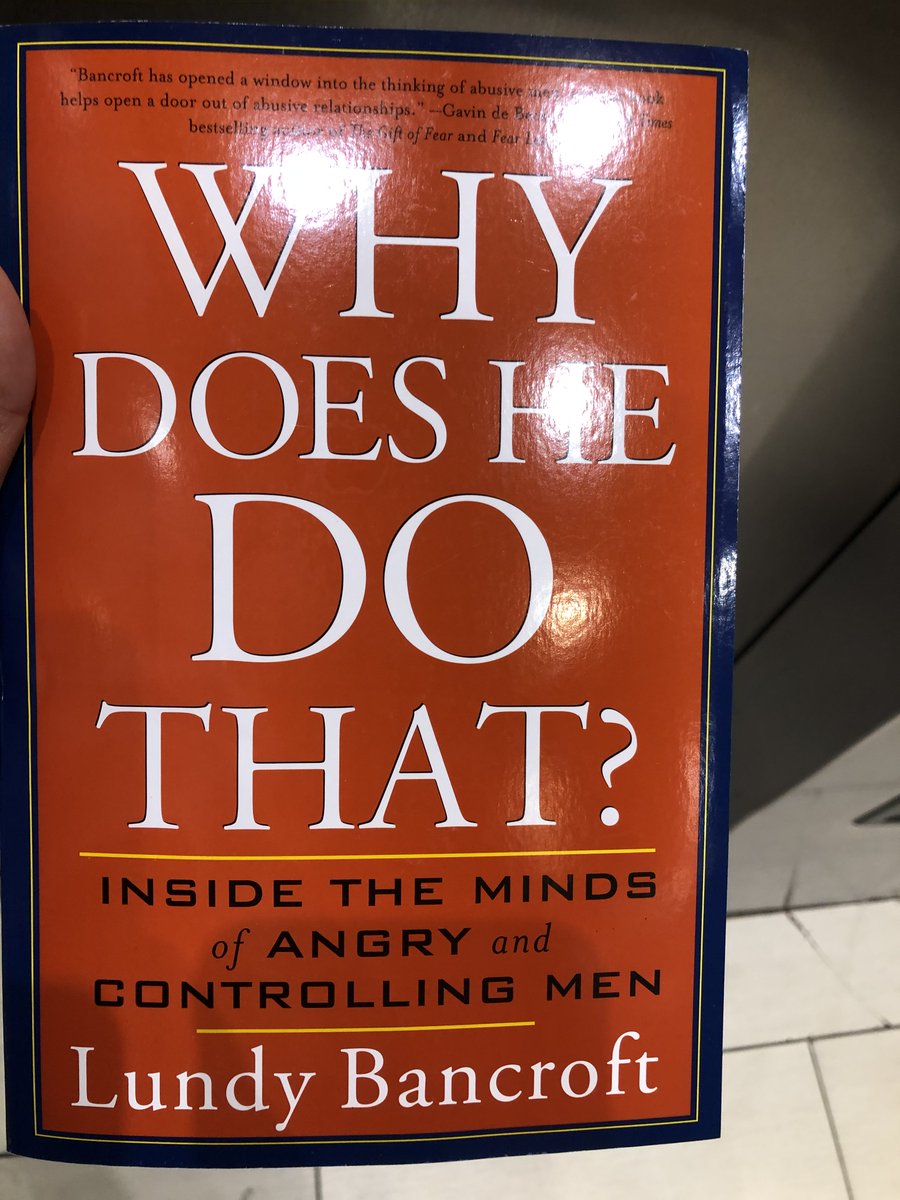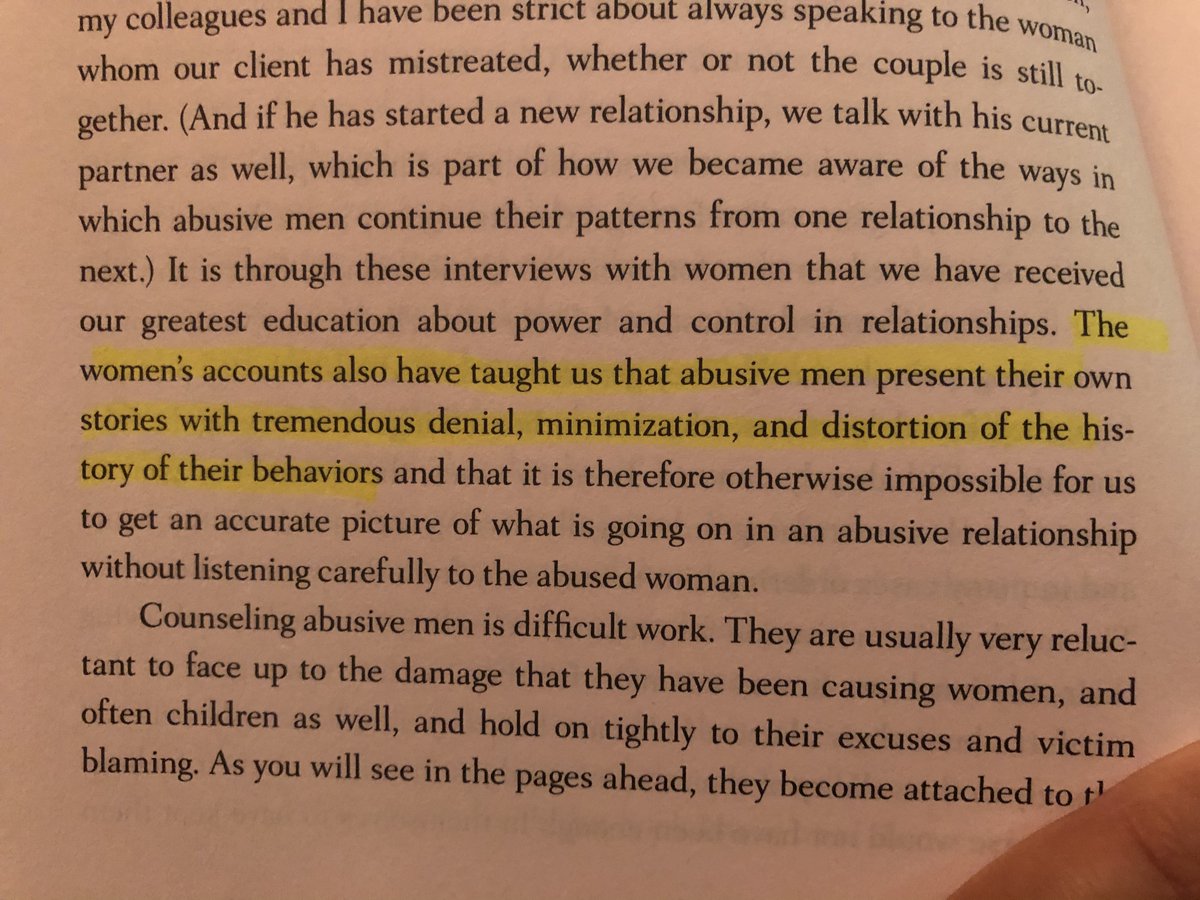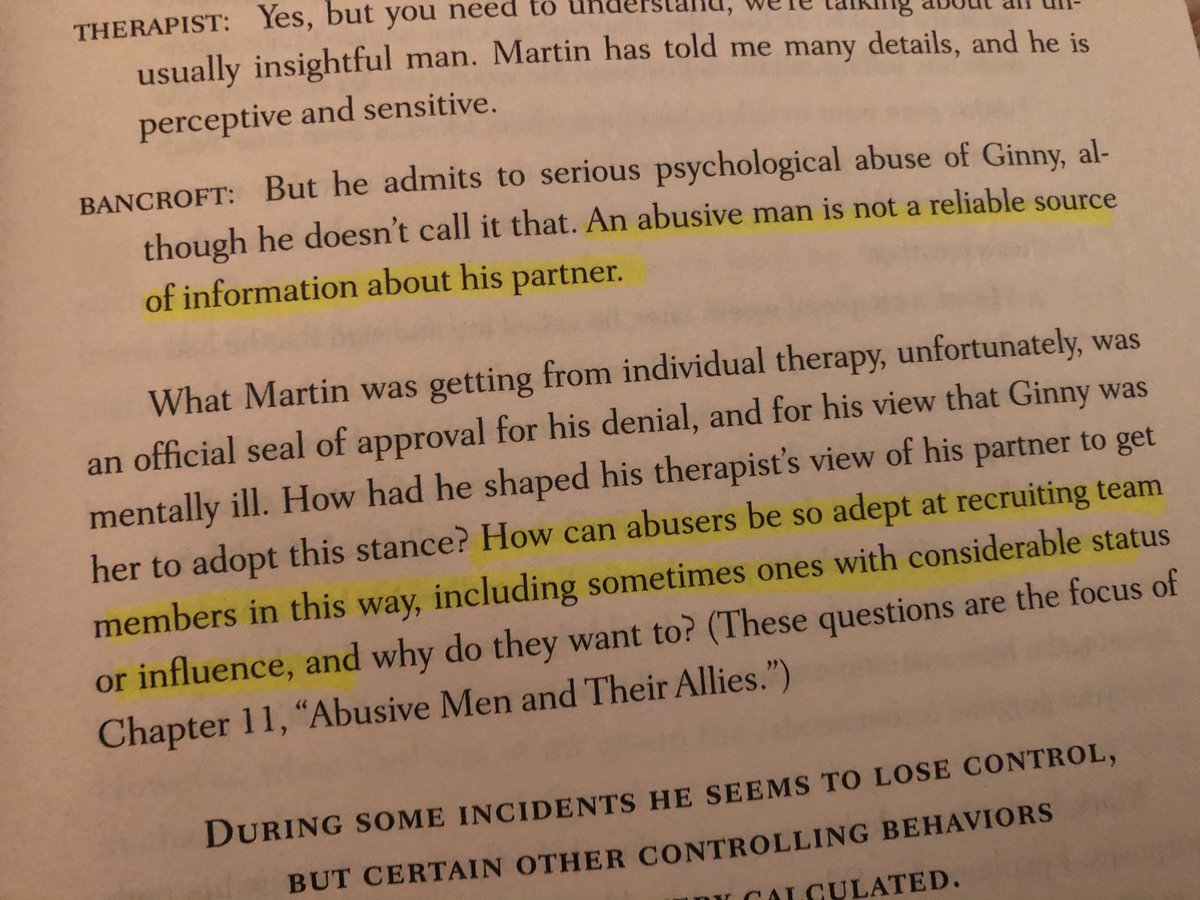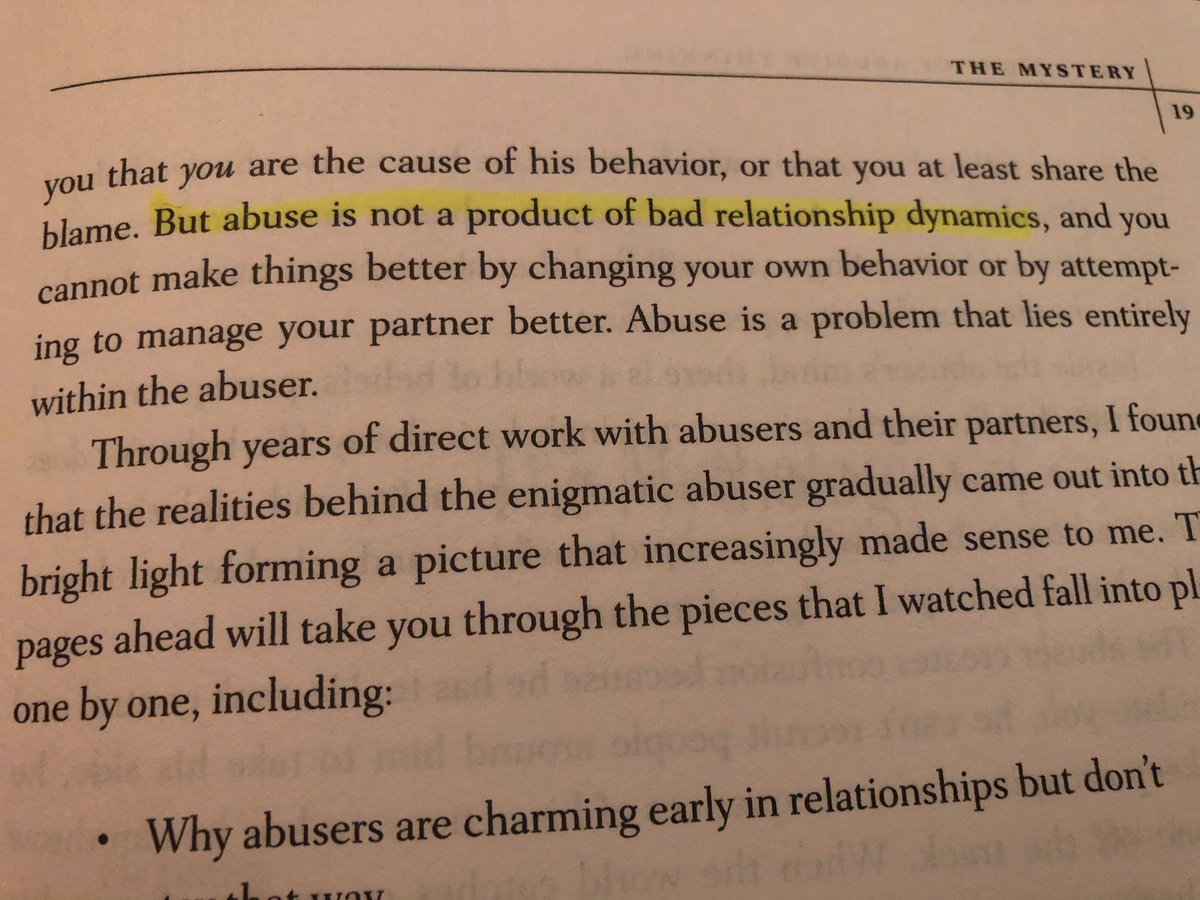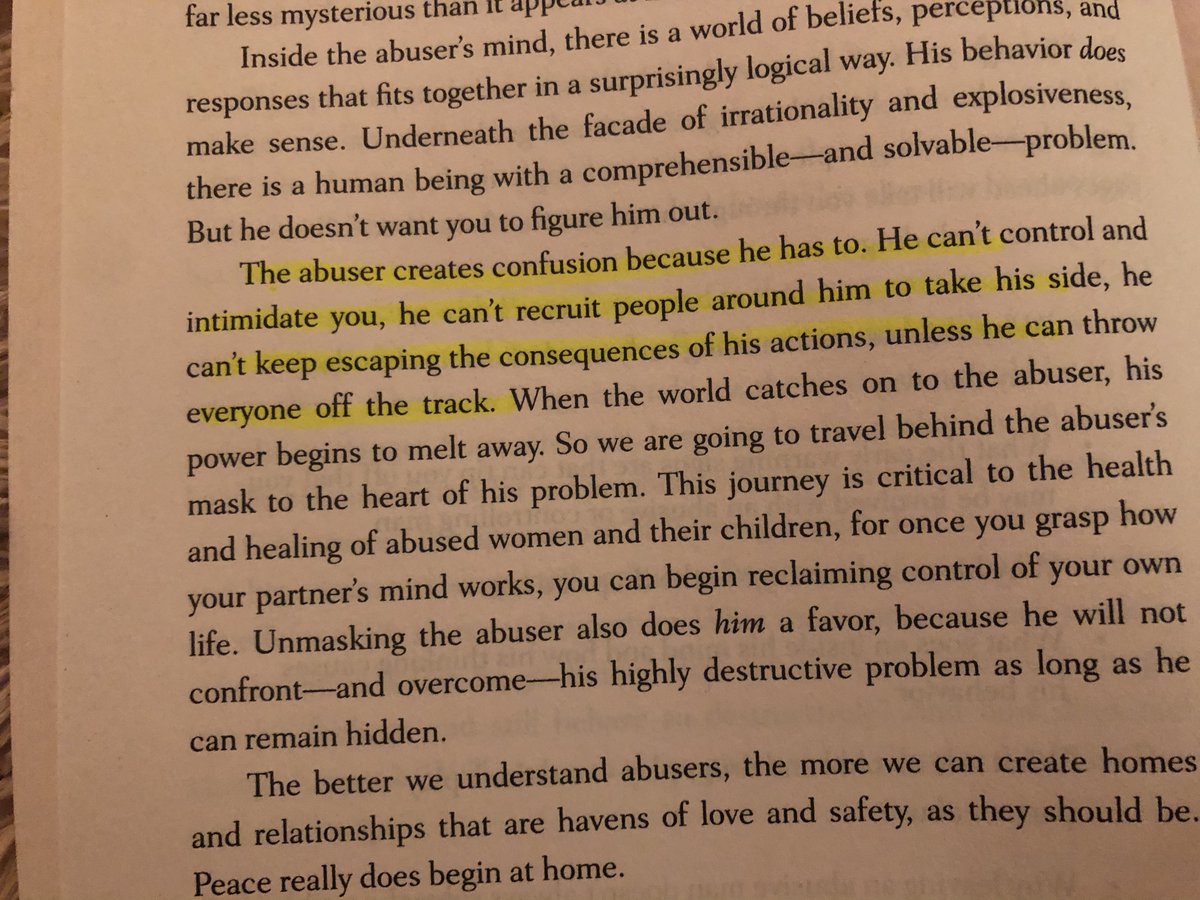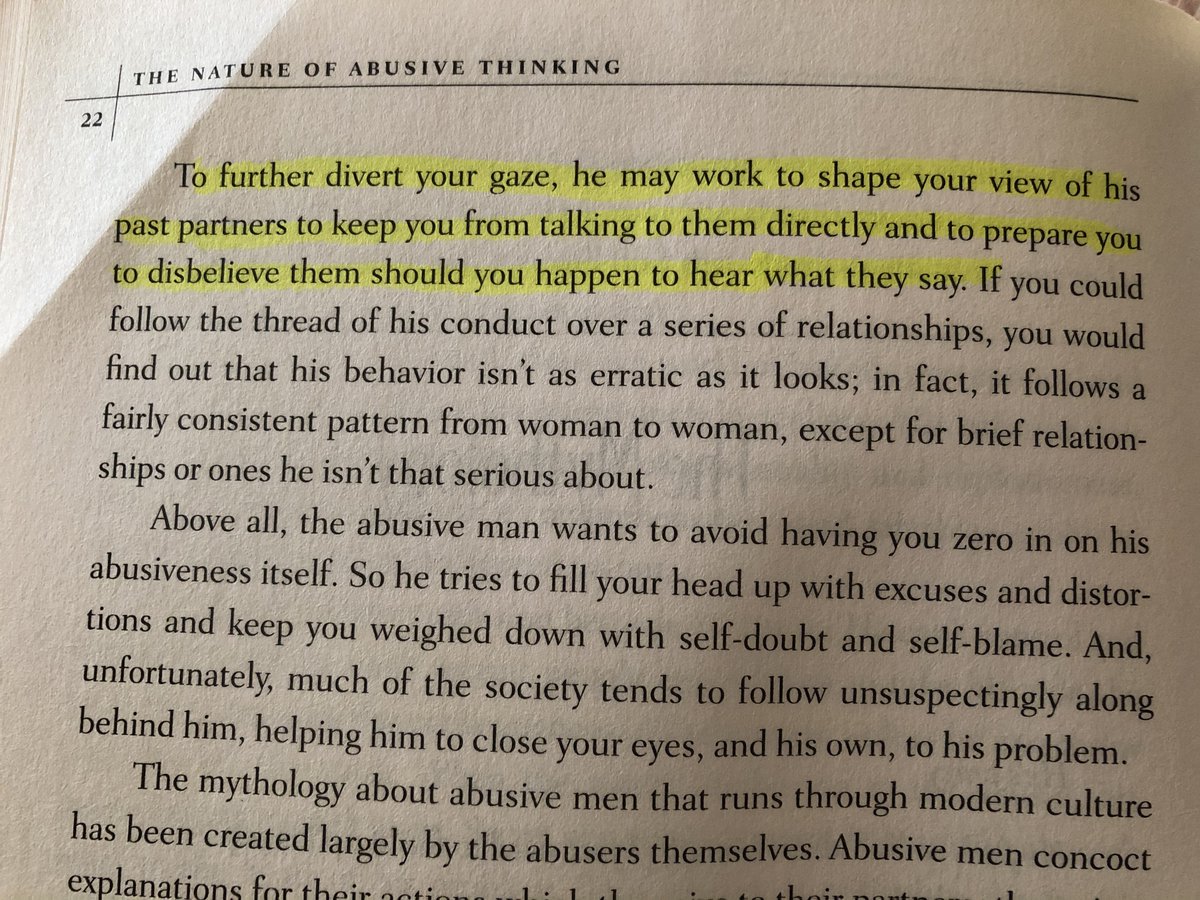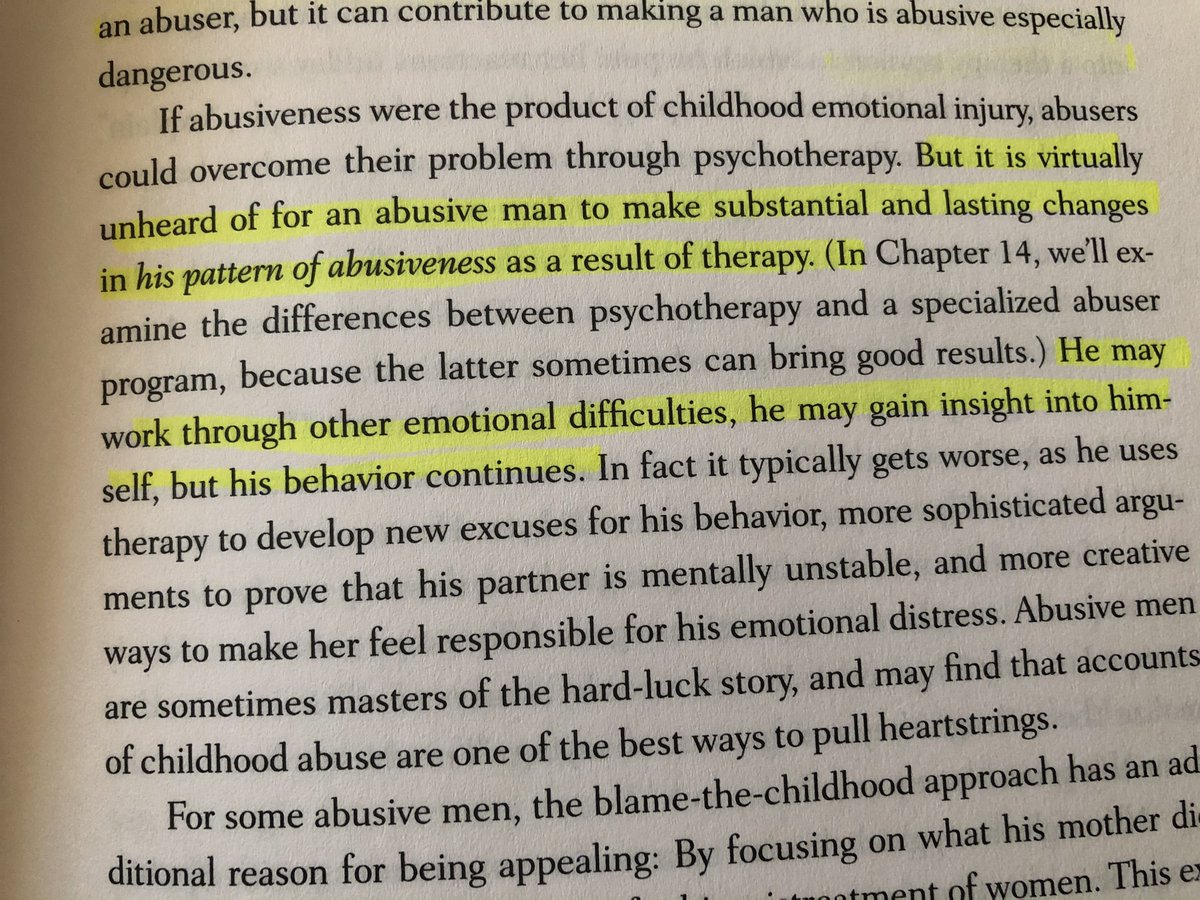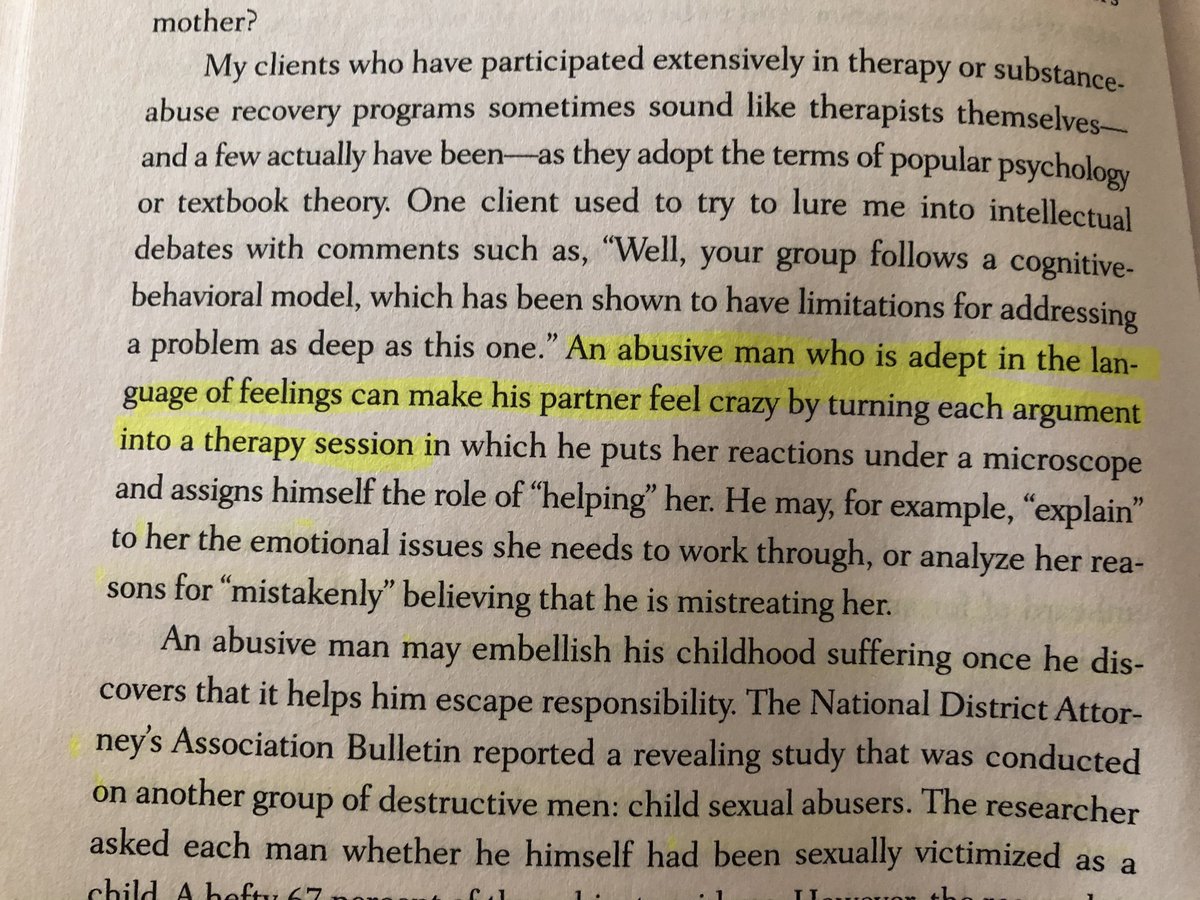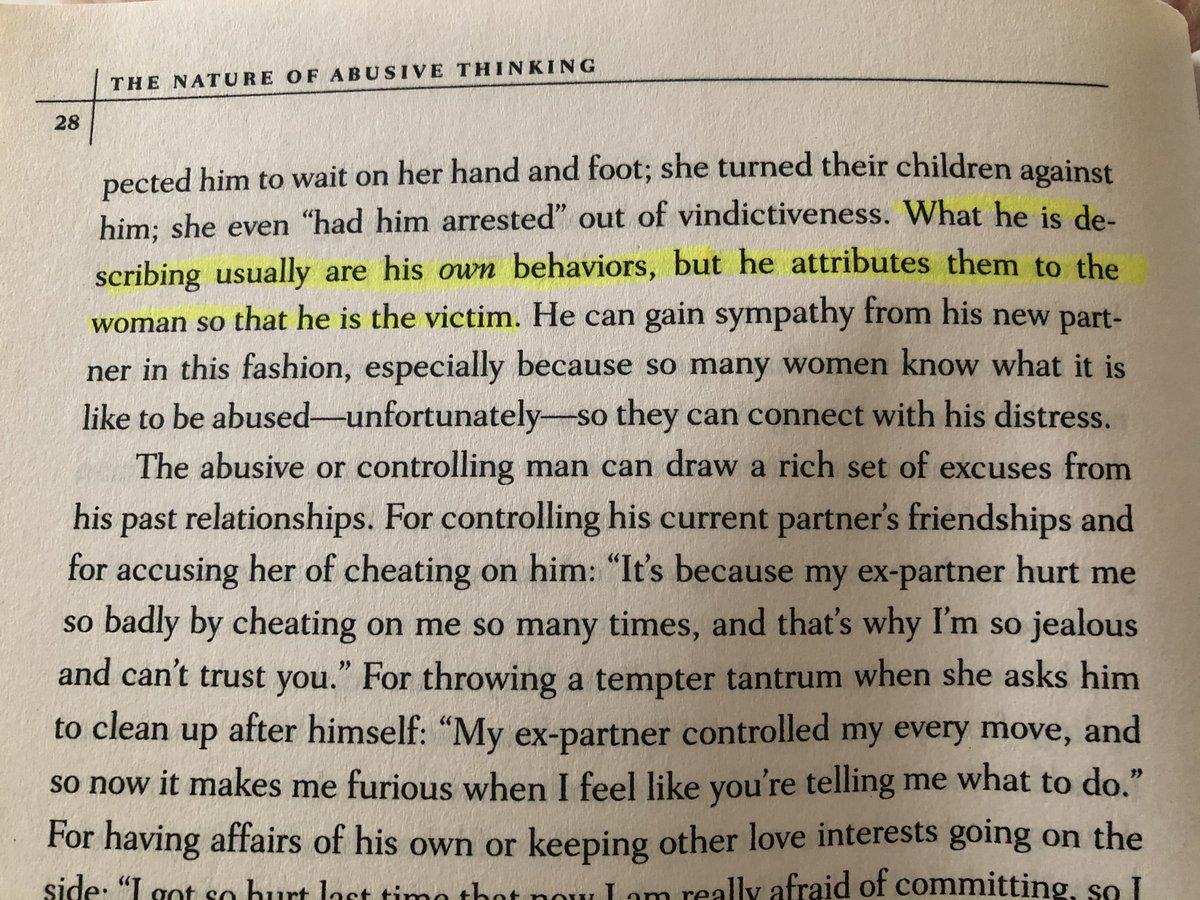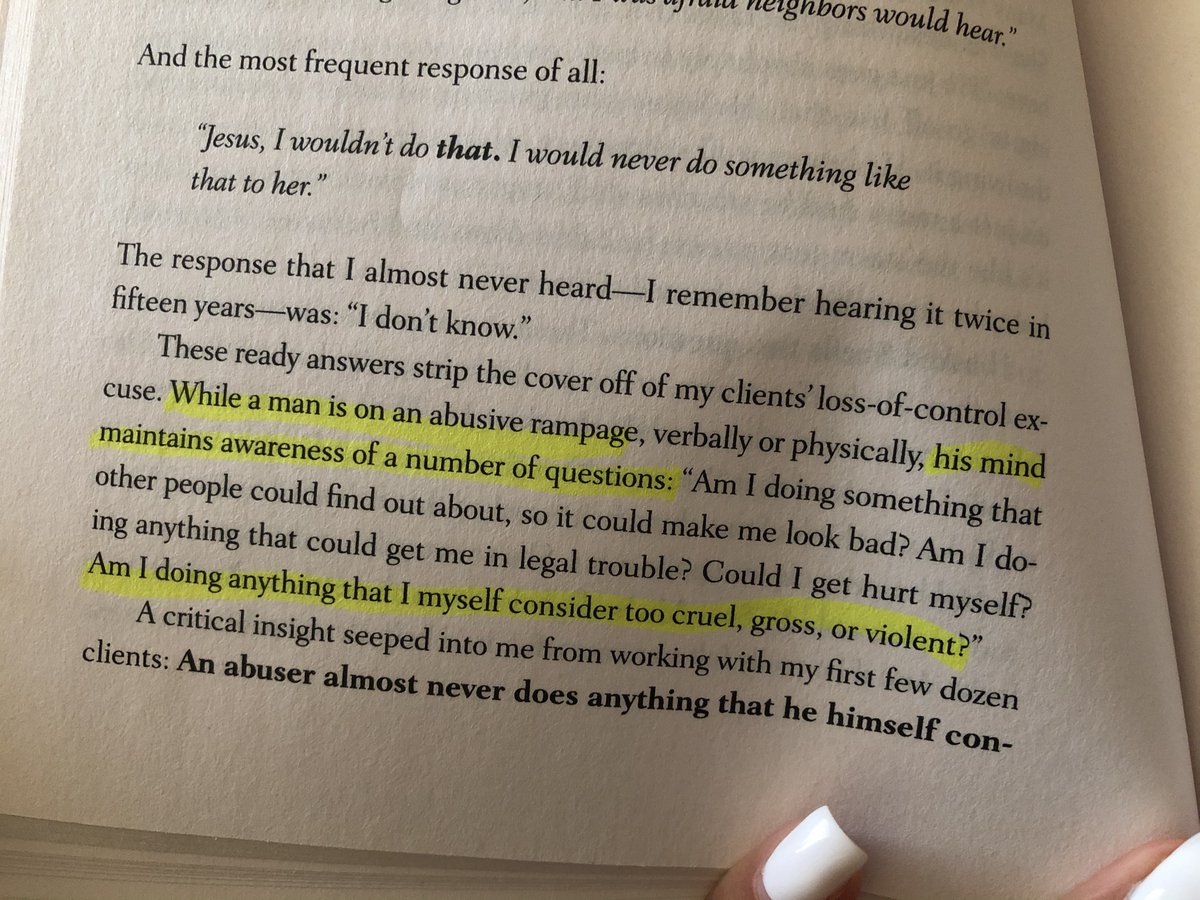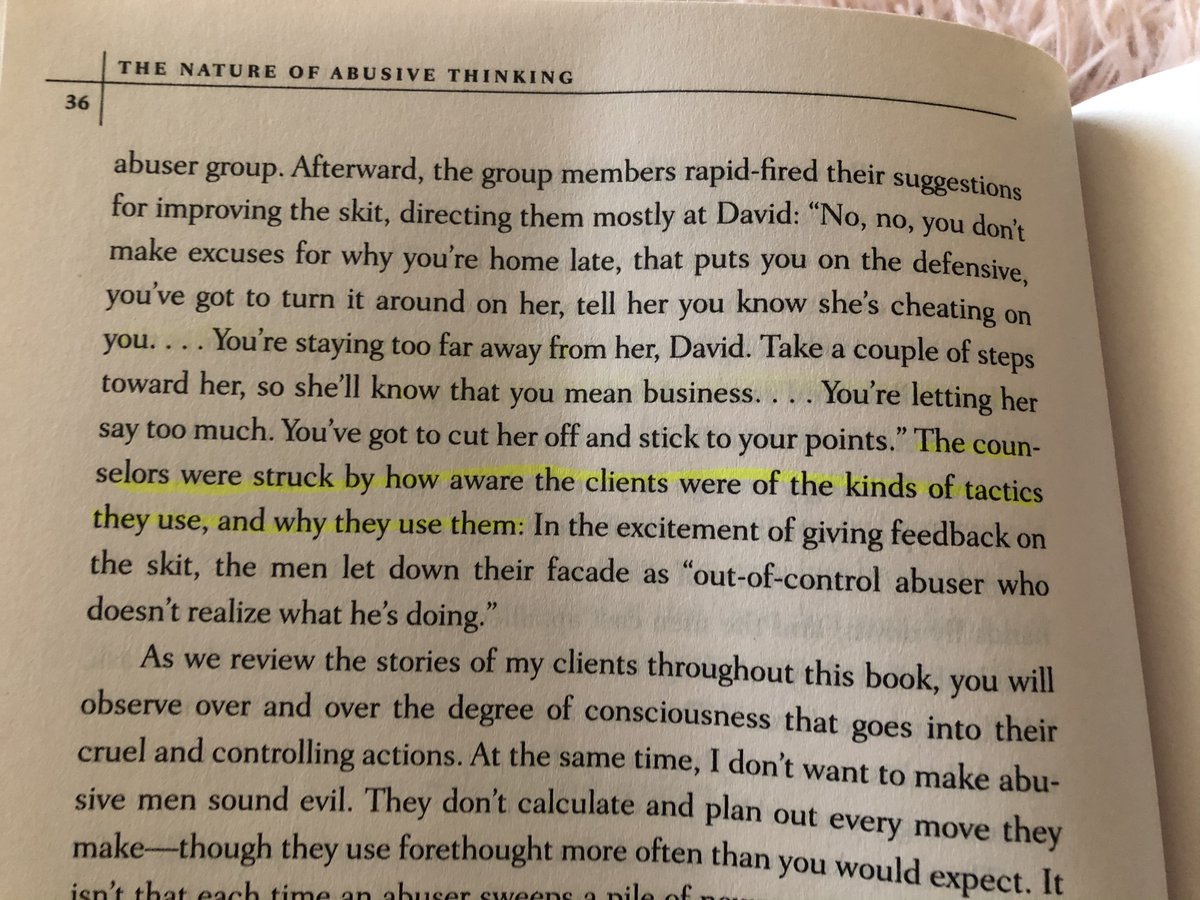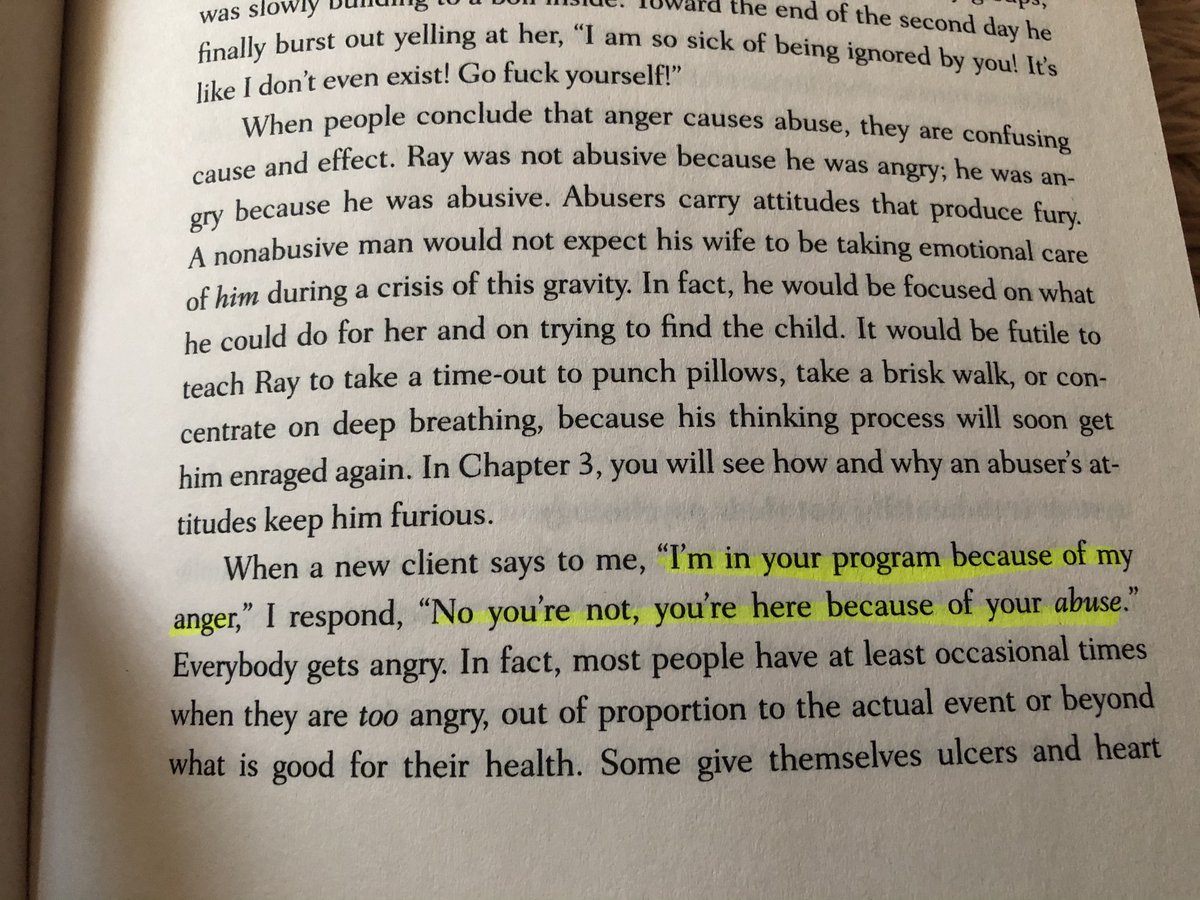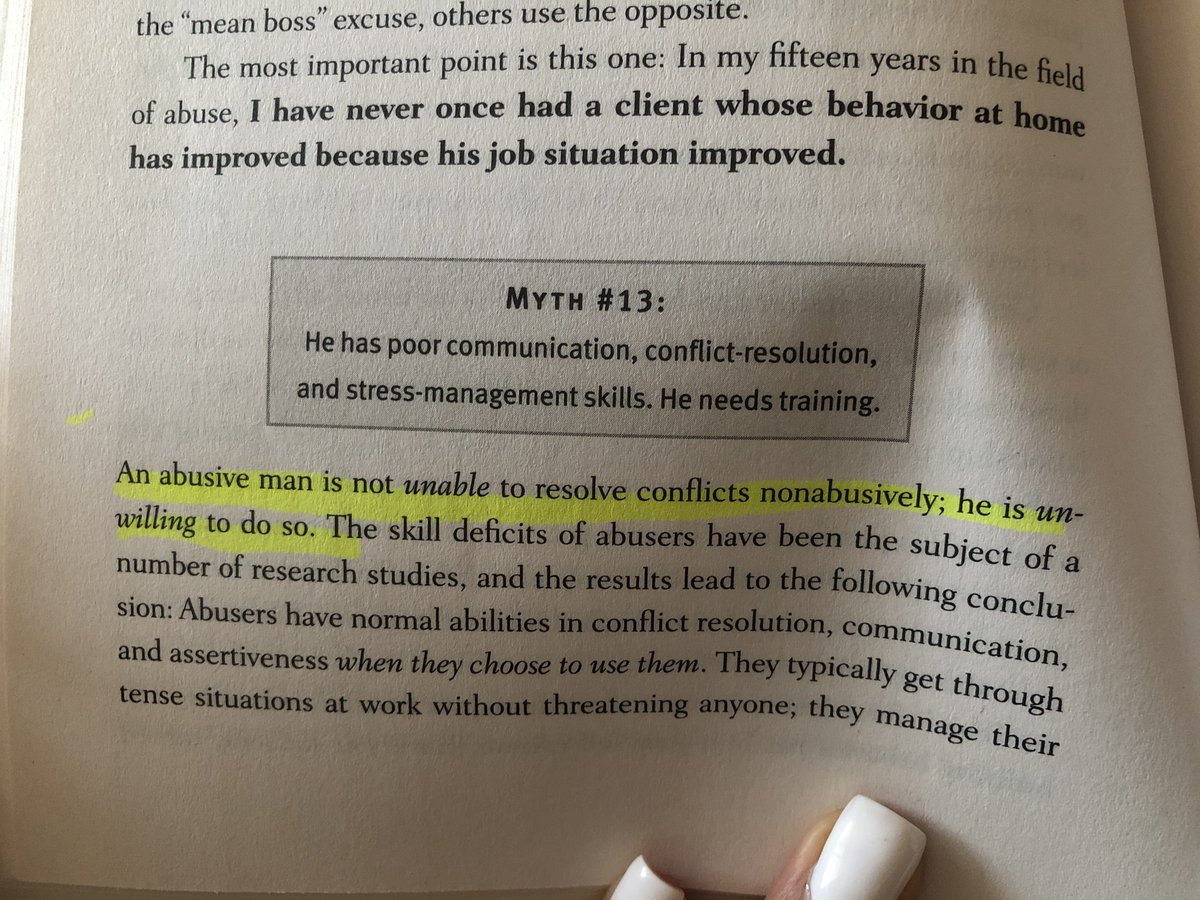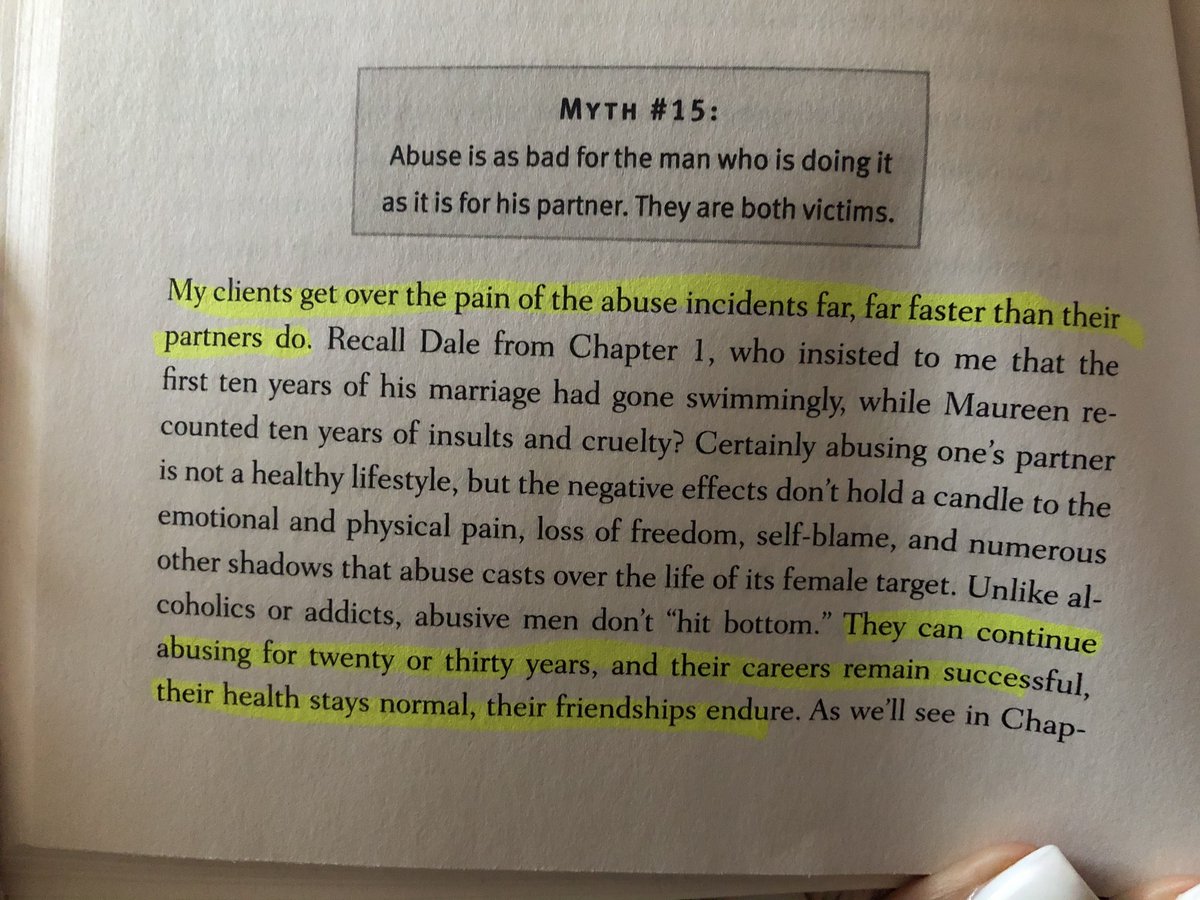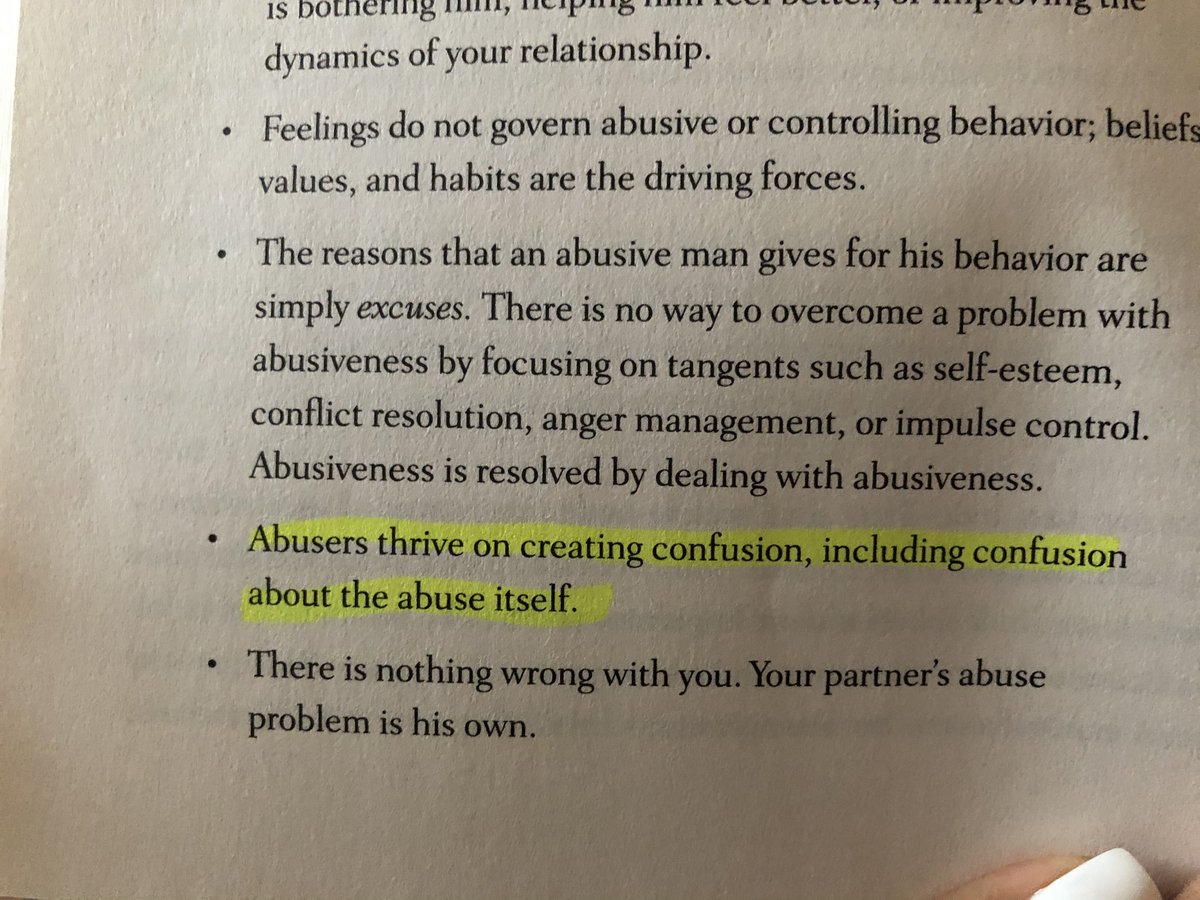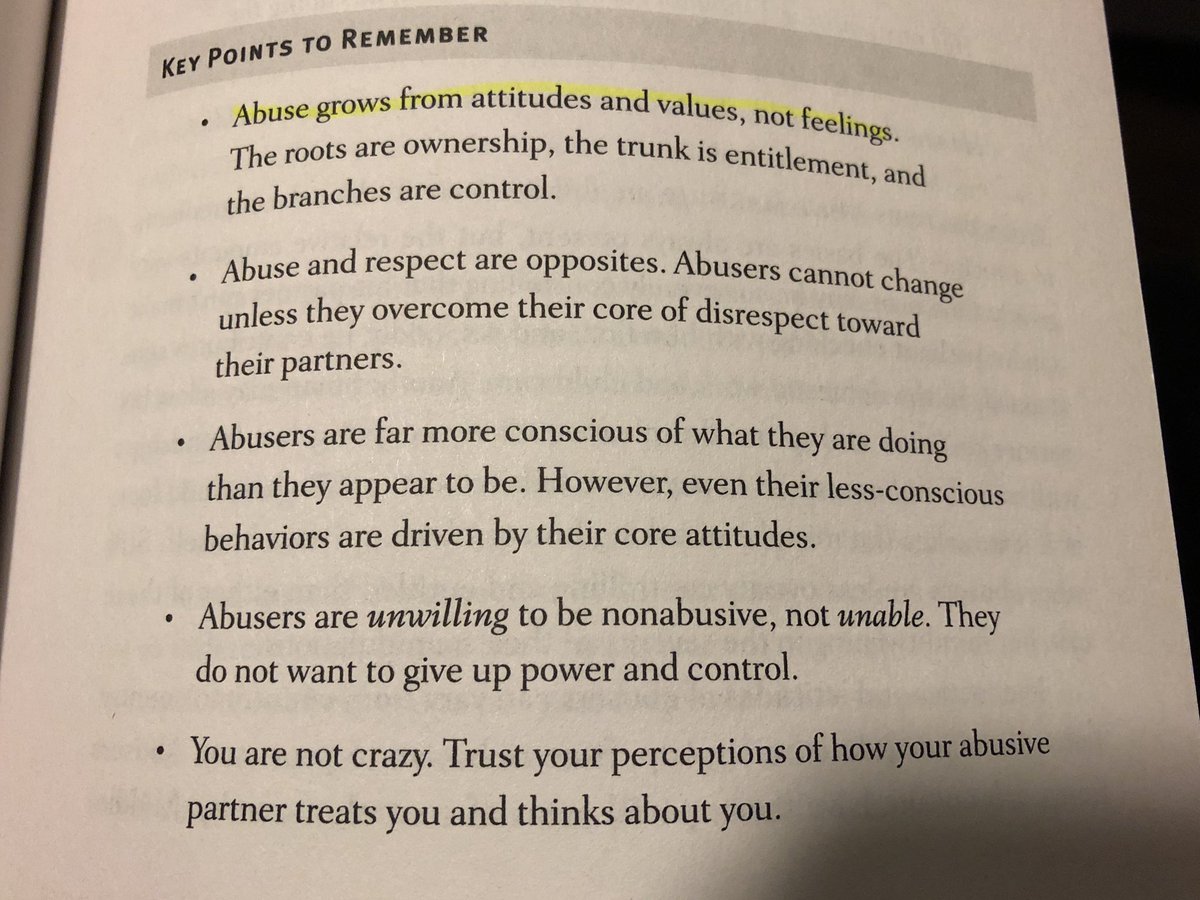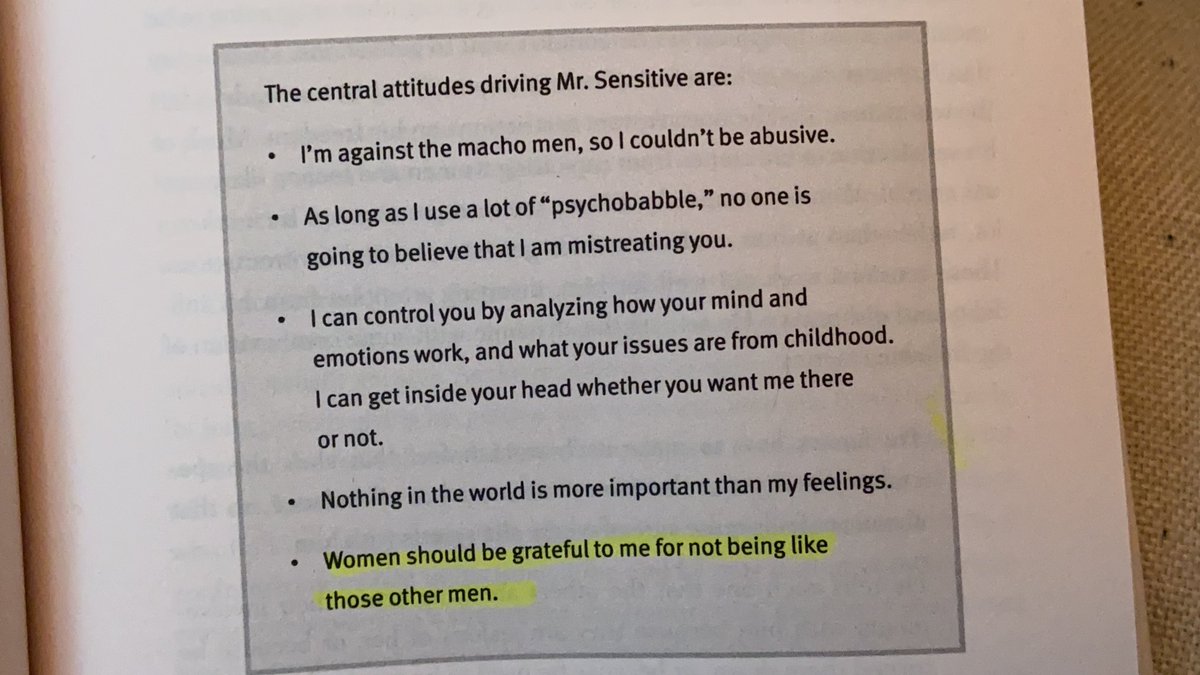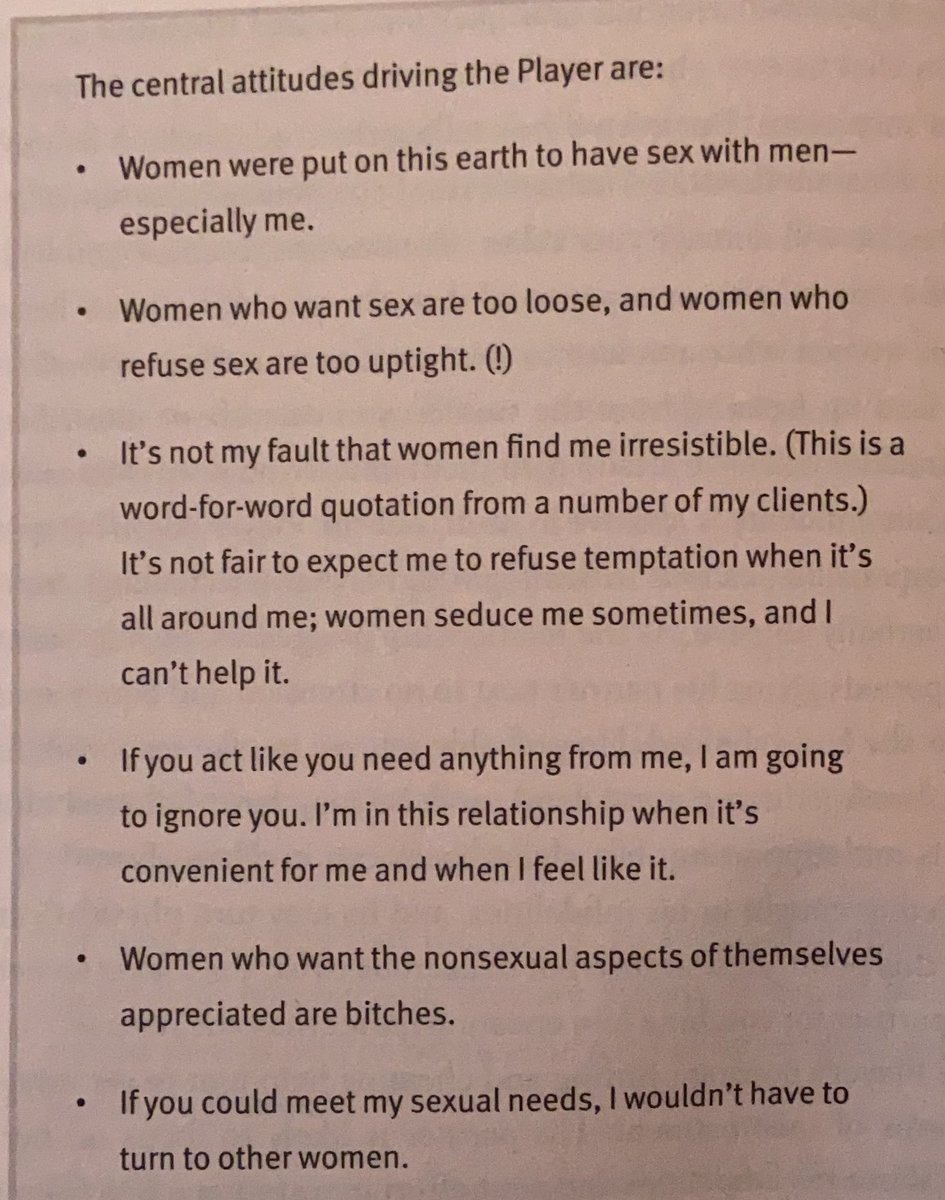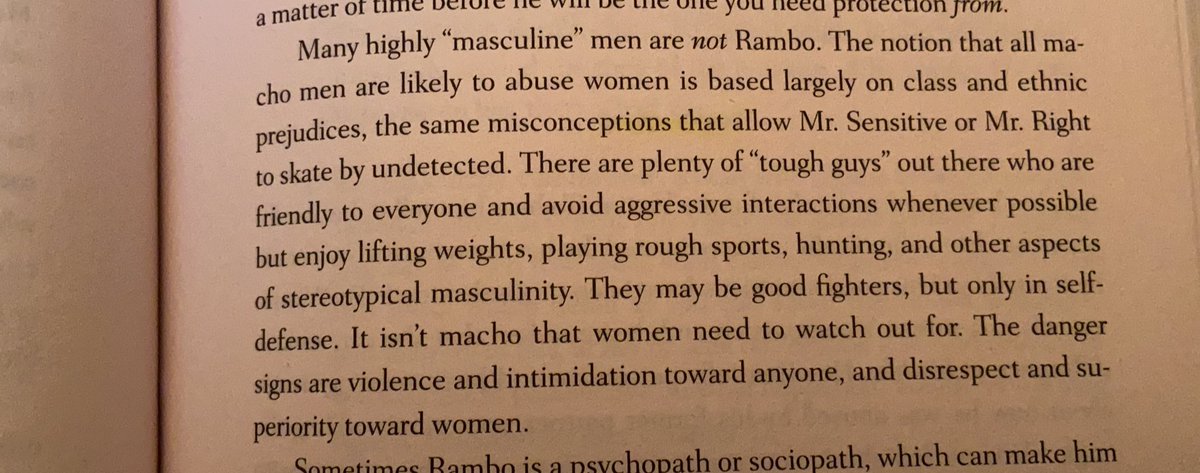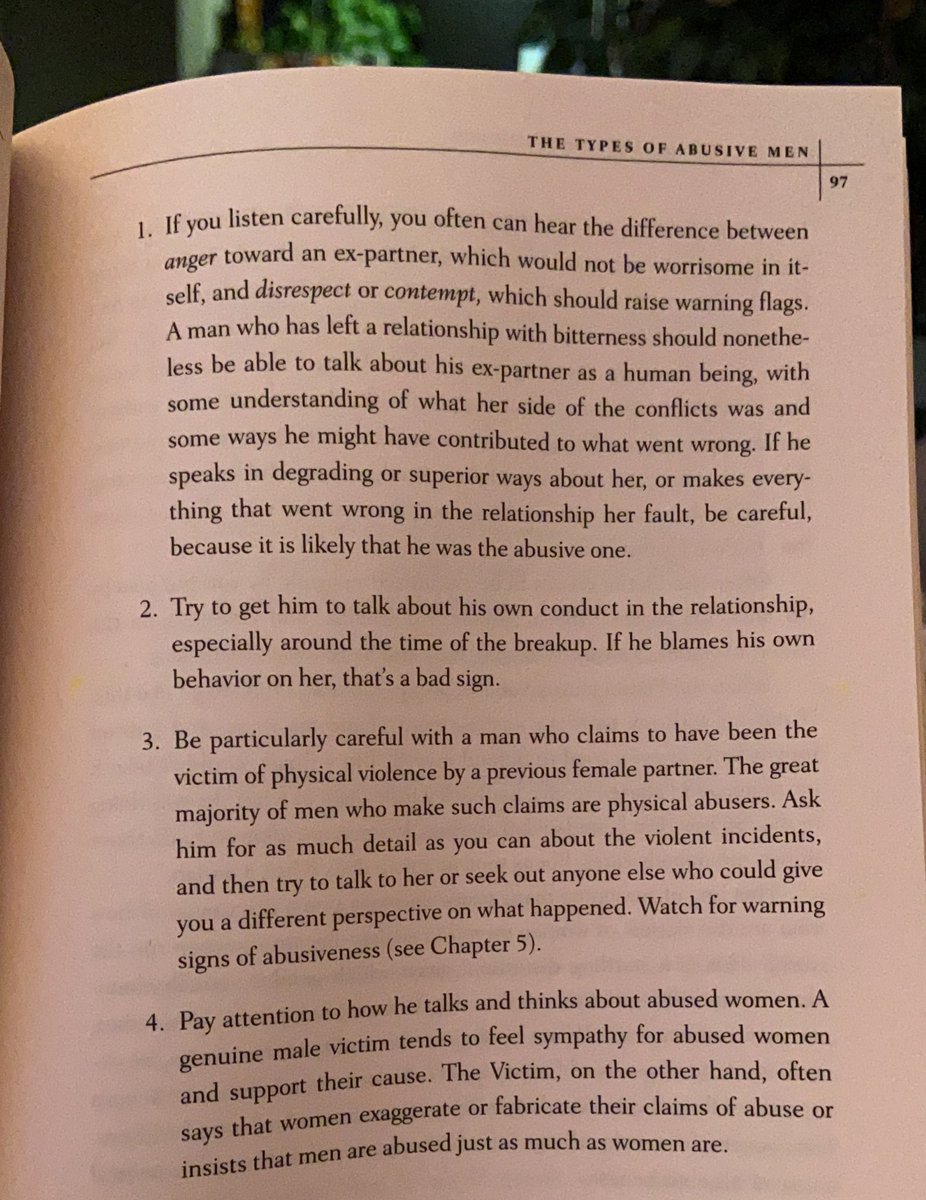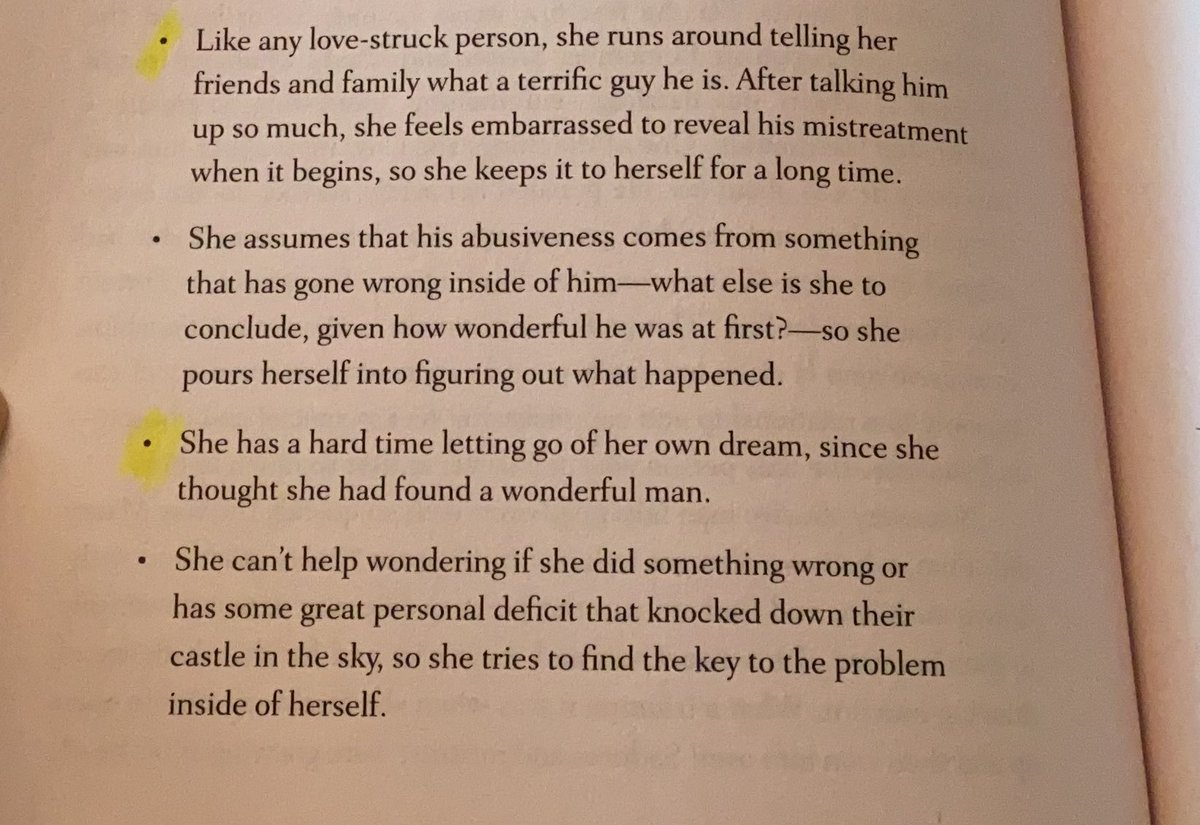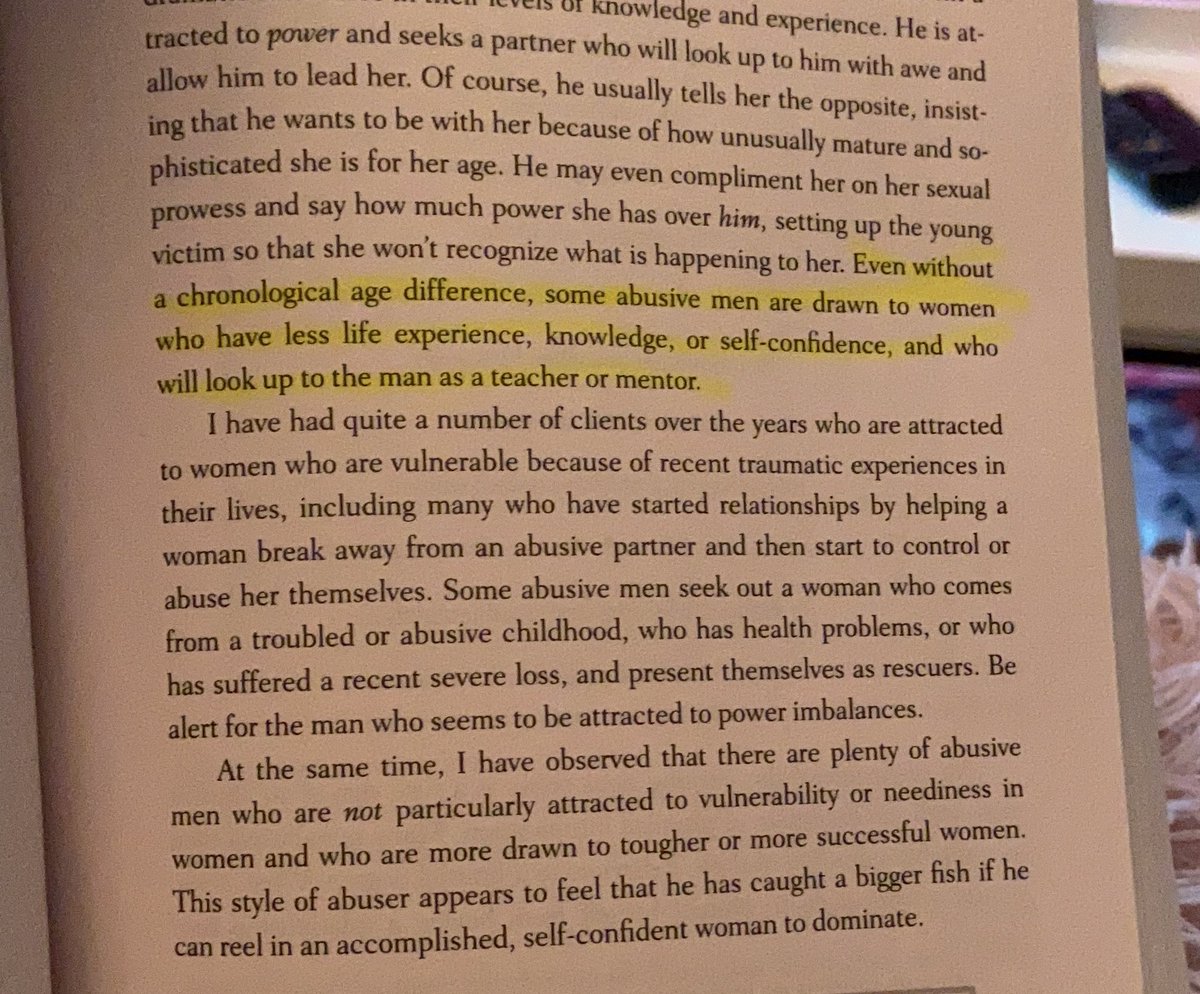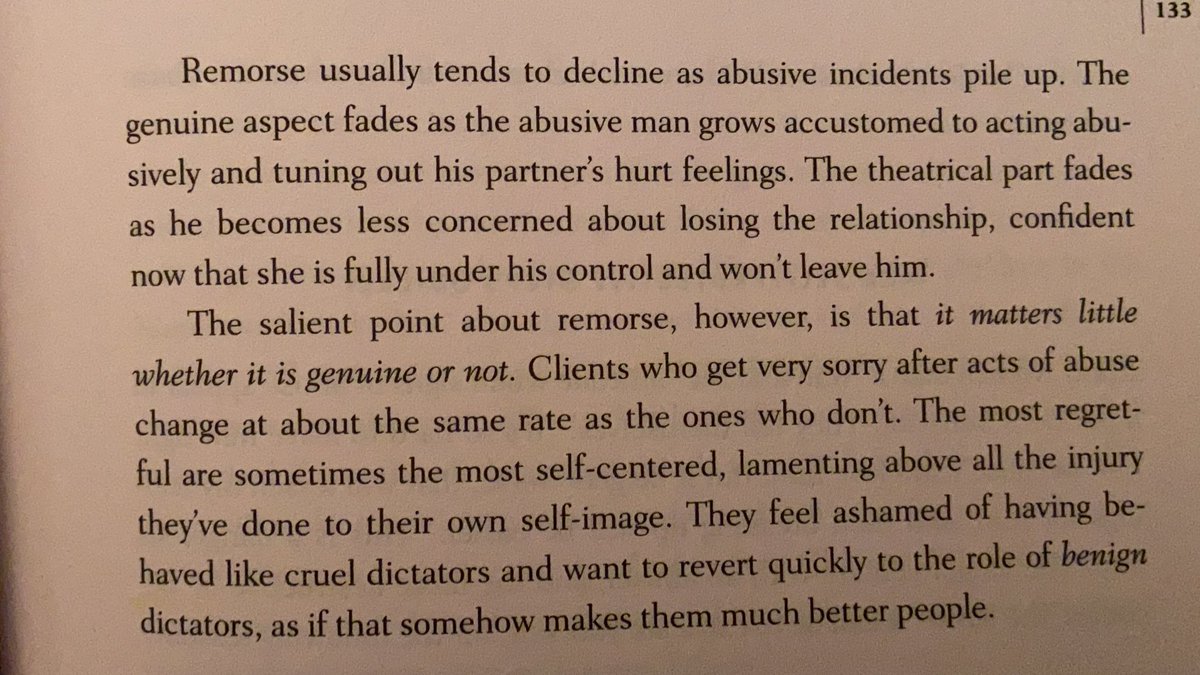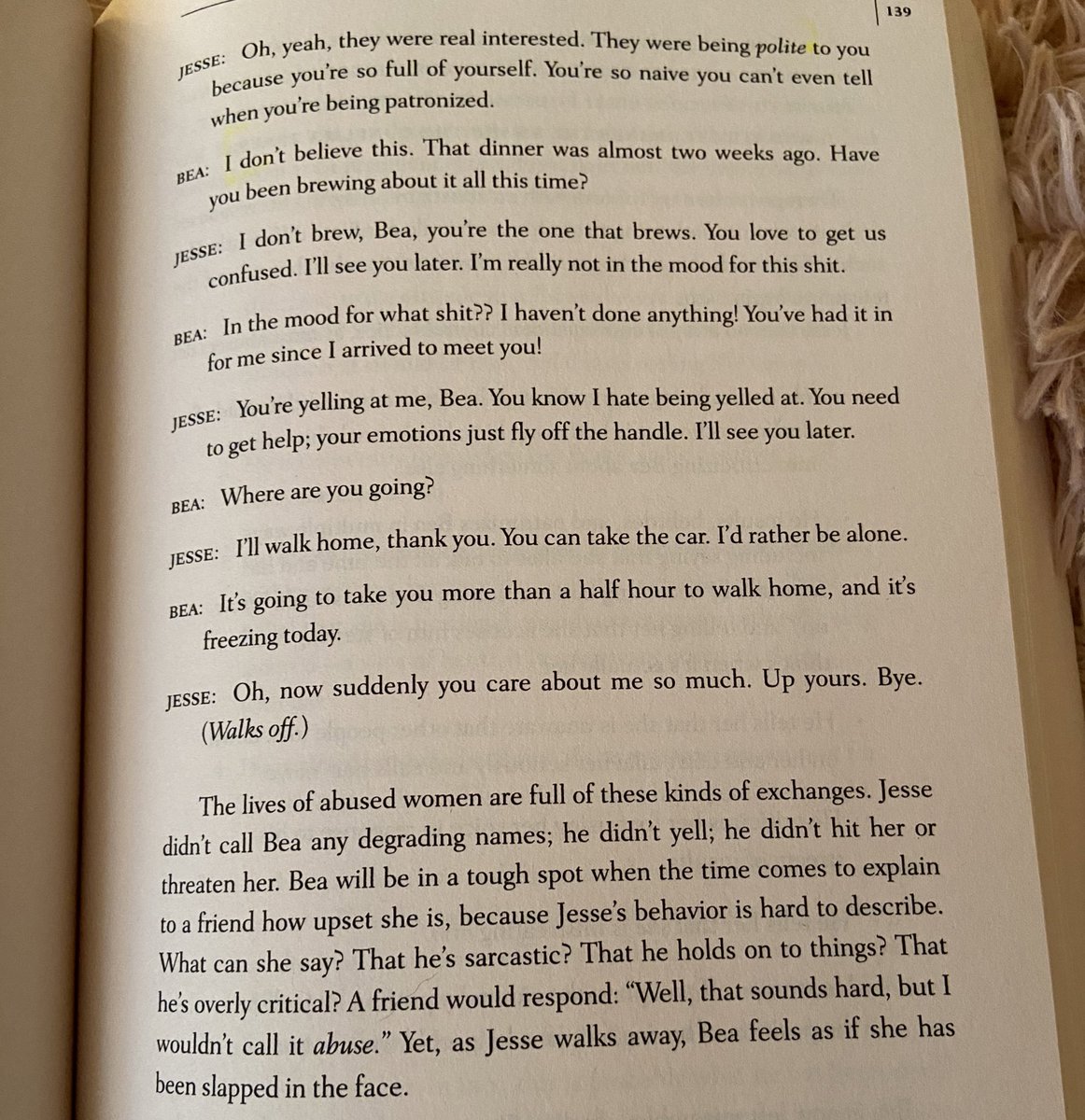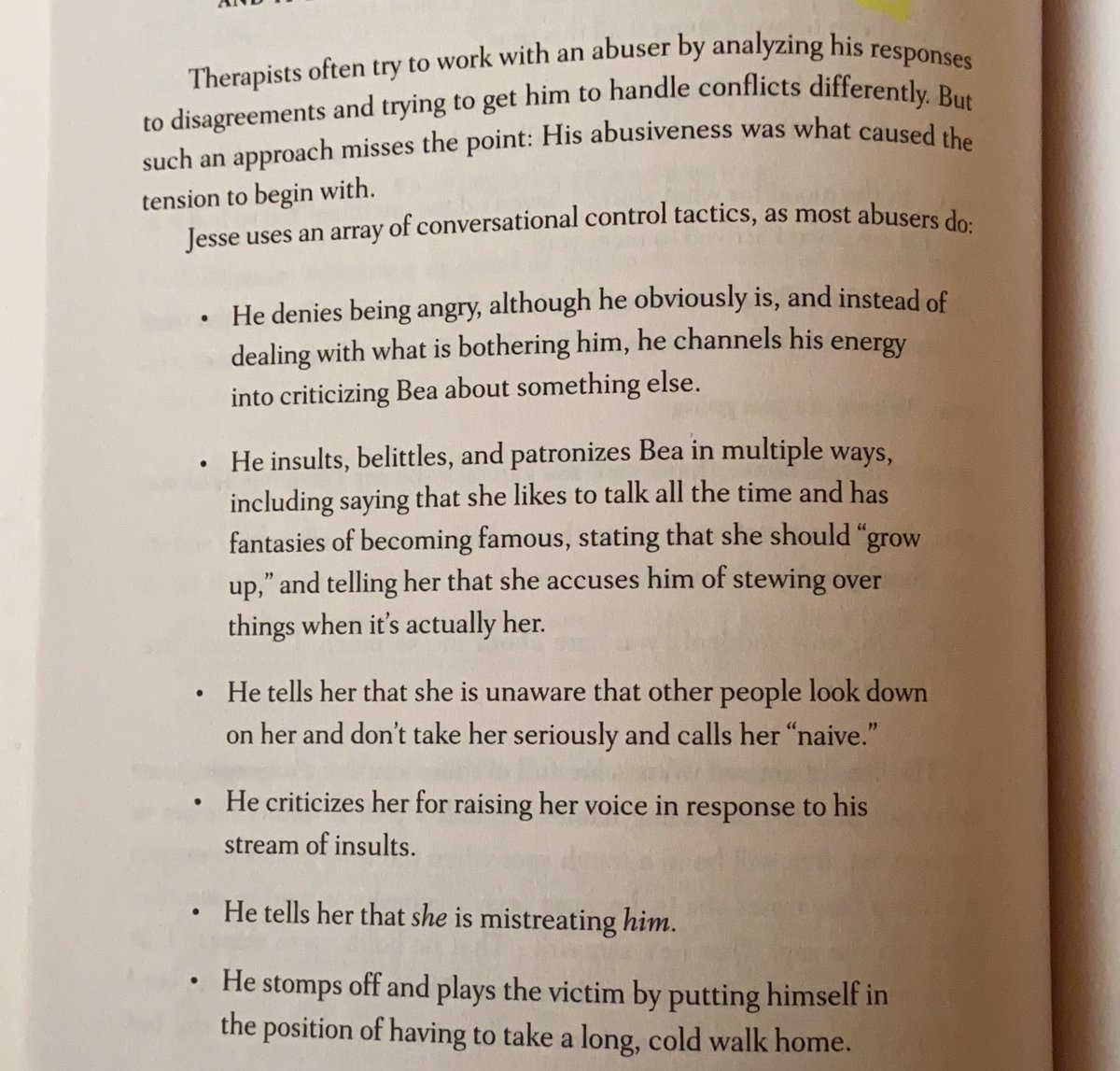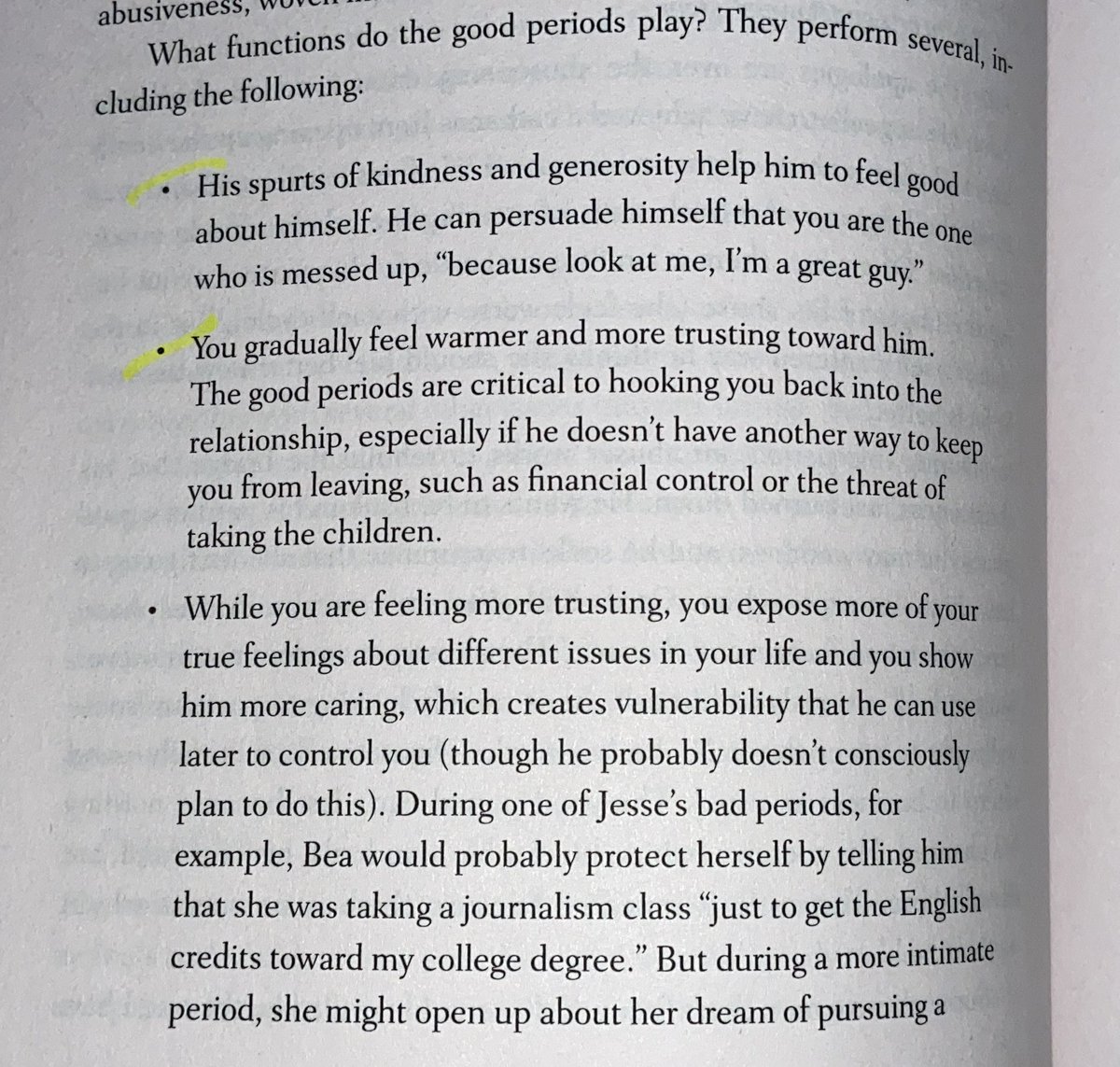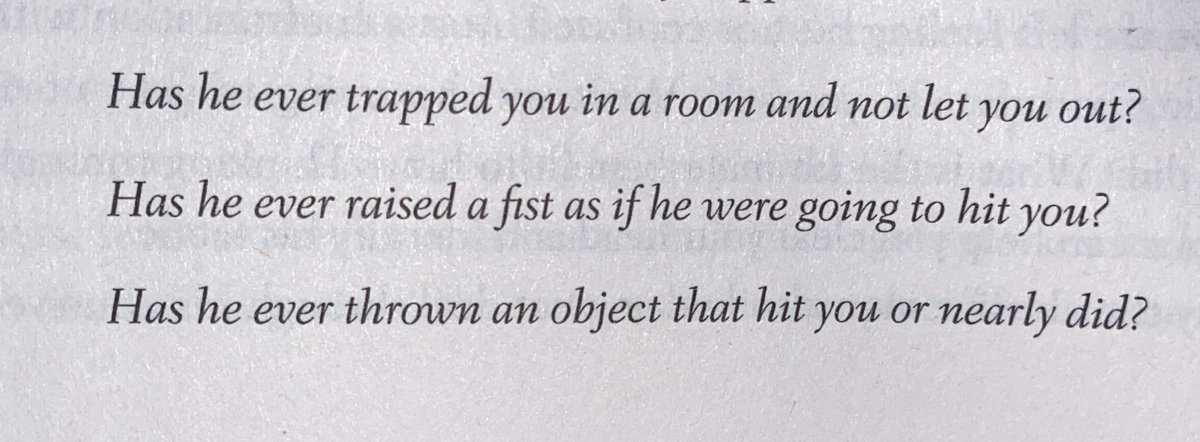TW// abuse
Super excited to read "Why Does He Do That?" Bancroft, the author, worked with abusive men for over 20 years.
The book explores exactly what the title says - why abusers abuse.
I'm going to live tweet over the next few months as I read along
Super excited to read "Why Does He Do That?" Bancroft, the author, worked with abusive men for over 20 years.
The book explores exactly what the title says - why abusers abuse.
I'm going to live tweet over the next few months as I read along

So, I read chapter 1 tonight. Bancroft briefly outlines what the book will be about and covers a few common questions partners of abusers typically ask.
Here, he discusses how important it is to speak directly to *partners* of abusers TO GET THE ACCURATE STORY.
Here, he discusses how important it is to speak directly to *partners* of abusers TO GET THE ACCURATE STORY.
"An abuser is not a reliable source of information about their partner."
Beyond details of the abuse, abusers tend to lie about who their victims are. What kind of people they are. How they show up. Their behavior.
It's necessary to build their ecosystem. To manipulate others.
Beyond details of the abuse, abusers tend to lie about who their victims are. What kind of people they are. How they show up. Their behavior.
It's necessary to build their ecosystem. To manipulate others.
Bitterness? Revenge? Displaced blame?
Convincing you and others that the survivor is the problem is how they escape confronting themselves and evade accountability.
"Abuse is a problem that lies entirely within the abuser."
Convincing you and others that the survivor is the problem is how they escape confronting themselves and evade accountability.
"Abuse is a problem that lies entirely within the abuser."
Ch. 1 entitled "The Mystery" ends discussing that abusers, in fact, are not a mystery at all. Nor is their behavior erratic to them.
It's strategic. Intentional. Necessary.
"One of the obstacles of recognizing ... is that most abusive people simply don't *seem* like abusers."
It's strategic. Intentional. Necessary.
"One of the obstacles of recognizing ... is that most abusive people simply don't *seem* like abusers."
Feel free to read along with me 
I’ll be reading chapter 2 today and posting about it tonight!!

I’ll be reading chapter 2 today and posting about it tonight!!
Chapter 2 looks at "The Mythology" i.e. the things we culturally, collectively, etc. believe about abusers that are actually false.
A few of these myths include:
- they were abused as a child
- they lose control
- they hate women
- they have poor communication skills
A few of these myths include:
- they were abused as a child
- they lose control
- they hate women
- they have poor communication skills
To kick off the chapter, Bancroft discusses how abusers work as magicians to confuse and distract you - including how abusers lie about past (or current) partners to manipulate you into thinking they are untrustworthy in case they speak out about their abuse.
Question #1: is it because he was abused as a child?
Answer: No. Many of us were abused as children & we *do not become abusers*
Further, Bancroft speaks to the unlikelihood that abusers will transform via therapy. Rather, they'll use the language they learn to their advantage.
Answer: No. Many of us were abused as children & we *do not become abusers*
Further, Bancroft speaks to the unlikelihood that abusers will transform via therapy. Rather, they'll use the language they learn to their advantage.
Abusers who seek counseling (for whatever reason, in this case for childhood abuse) use therapeutic skills/knowledge to sharpen their abuse.
We see similar examples when abusers in organizing spaces use feminist language, for example, to minimize, distort, manipulate, etc.
We see similar examples when abusers in organizing spaces use feminist language, for example, to minimize, distort, manipulate, etc.
Myth #2: He had a previous partner who mistreated him and now he has a problem with women, in general.
Bancroft discusses how abusers describe their past relationships and the behaviors of ex's - often, their descriptions are actually projections of their own behavior.
Bancroft discusses how abusers describe their past relationships and the behaviors of ex's - often, their descriptions are actually projections of their own behavior.
Myth #3: he loses control
"You called her a whore and shoved her to the ground. There she was at your feet where it would have been easy to kick her. What stopped you?"
An abuser almost never does anything he considers morally unacceptable.
"You called her a whore and shoved her to the ground. There she was at your feet where it would have been easy to kick her. What stopped you?"
An abuser almost never does anything he considers morally unacceptable.
This section was so interesting/important. Bancroft explains that every abuser has their own set of values in the realm of their abuse to justify their actions.
They are aware of their actions; in no way are they "out of control." They know what they can/can't get a way with.
They are aware of their actions; in no way are they "out of control." They know what they can/can't get a way with.
Bancroft was preparing a skit for a conference and the abuser group watched. They commented on what needed to be changed, based on their own abusive tactics.
ABUSERS ARE STRATEGIC AND INTENTIONAL.
ABUSERS ARE STRATEGIC AND INTENTIONAL.
Myth #7: He's too angry, he needs anger management
Everyone experiences anger and rage. Most of us are not abusers.
"You're not abusive because you're angry. You're angry because you're abusive."
Everyone experiences anger and rage. Most of us are not abusers.
"You're not abusive because you're angry. You're angry because you're abusive."
Further, Bancroft goes on to explain that, "perhaps their loudest most intimidating forms of abuse come out when they're angry but their deeper pattern is operating all the time."
i.e. coercion, jealousy, possessiveness, etc.
i.e. coercion, jealousy, possessiveness, etc.
Myth #13: Poor communication or conflict resolution
It ain't that, sis. No matter how much you sit with an abuser to discuss communication styles or tips for navigating conflict, it doesn't matter.
An abuser is not unable, they are unwilling.
It ain't that, sis. No matter how much you sit with an abuser to discuss communication styles or tips for navigating conflict, it doesn't matter.
An abuser is not unable, they are unwilling.
We speak a lot about the impacts of abuse on survivors and how abusers seem to carry on with life, uninterrupted. Their career remains the same. There's no pause in production. No major loss of support.
"Abusers tend to benefit from their controlling behaviors."
"Abusers tend to benefit from their controlling behaviors."
To end the chapter, Bancroft offers a summary of all the myths.
He includes a reminder that abusers love the circus. They love the mess. The confusion is a necessary tactic - we know they cannot afford to have people focus on the truth.
He includes a reminder that abusers love the circus. They love the mess. The confusion is a necessary tactic - we know they cannot afford to have people focus on the truth.
Here’s a free copy of the book if you’d like to read along with me. I’m only on chapter 2! 
https://twitter.com/spicylighter/status/1293705776712712192?s=21 https://twitter.com/spicylighter/status/1293705776712712192

https://twitter.com/spicylighter/status/1293705776712712192?s=21 https://twitter.com/spicylighter/status/1293705776712712192
Tweeting ch. 3 tonight girlies!! 

Ok I lied lol bitches is tired  but if you’re reading with me, read ch 3!! And we’ll chat tomorrow.
but if you’re reading with me, read ch 3!! And we’ll chat tomorrow.
 but if you’re reading with me, read ch 3!! And we’ll chat tomorrow.
but if you’re reading with me, read ch 3!! And we’ll chat tomorrow.
Ok ch. 3: The Abusive Mentality
In this chapter, Bancroft breaks down the *the realities* — abusers are controlling, entitled, think they’re superior, etc.
Let’s get into it!
In this chapter, Bancroft breaks down the *the realities* — abusers are controlling, entitled, think they’re superior, etc.
Let’s get into it!
“Abusers create misconceptions to get you to doubt yourself and make it possible to lead you down-dead end paths.”
Your abuser wants your brain to be mush skjisksksisks it’s a prerequisite
Your abuser wants your brain to be mush skjisksksisks it’s a prerequisite
One thing that stuck out to me is that, with an abuser, every conversation where you hold them to task prompts a retaliation.
Even small convos naming shit they do, results (immediately or later) in a punishment for daring to name the abuse.
Even small convos naming shit they do, results (immediately or later) in a punishment for daring to name the abuse.
“Entitlement” is the abusers belief that they are special and deserve exclusive rights.
The abuser awards themselves all kinds of rights, including:
- physical caretaking
- emotional caretaking
- sexual caretaking
- deference
- FREEDOM FROM ACCOUNTABILITY
The abuser awards themselves all kinds of rights, including:
- physical caretaking
- emotional caretaking
- sexual caretaking
- deference
- FREEDOM FROM ACCOUNTABILITY

Sexual caretaking looks like the abuser considering it their partner’s duty to keep them sexually satisfied.
For some abusers, that means using coercion and assault to get sex *under their terms* as a way to undermine you.
For some abusers, that means using coercion and assault to get sex *under their terms* as a way to undermine you.
Freedoms from accountability means the abuser considers themselves above criticism and may retaliate if anyone tries to get them to look at their behavior.
Further, they feel you are controlling THEM because they don’t believe you should insist they meet your needs.
Further, they feel you are controlling THEM because they don’t believe you should insist they meet your needs.
“One of the basic human rights they take away from you is the right to be angry with them.”
It’s not their anger, it’s YOUR anger.
It’s not their anger, it’s YOUR anger.
Signs of manipulation:
- denying the obvious about what they are doing or feeling
- getting you to feel sorry for them
- getting you to blame yourself
- lying about their actions, desires or reasons for doing things
- denying the obvious about what they are doing or feeling
- getting you to feel sorry for them
- getting you to blame yourself
- lying about their actions, desires or reasons for doing things
And I think the most important point of this entire chapter is: THE ABUSER STRIVES TO HAVE A GOOD PUBLIC IMAGE
Yes, the organizers who do “great work” ...it’s not by accident
I just had to screenshot this whole page cuz it’s a read

Yes, the organizers who do “great work” ...it’s not by accident
I just had to screenshot this whole page cuz it’s a read


“MOST ABUSERS PUT ON A CHARMING FACE FOR THEIR COMMUNITY CREATING A SHARP SPLIT BETWEEN THEIR PUBLIC IMAGE AND PRIVATE TREATMENT”
I mean... lol right?
I mean... lol right?
Moreover, “the abusers nice guy front helps them feel good about themself.”
It’s not just for the community, it’s for themselves too. “Doing good work” helps them rationalize their harm.
But it does slip out for the community to see, if we pay attention/choose to believe it...
It’s not just for the community, it’s for themselves too. “Doing good work” helps them rationalize their harm.
But it does slip out for the community to see, if we pay attention/choose to believe it...
One of the other pieces that stuck with me is this question of “are abusers just psychopaths or evil?” “Do they feel empathy?”
Yes *and* not long enough for it to matter.
Yes *and* not long enough for it to matter.
Ch. 3 ends with takeaway points including: “abuse grows from attitudes and values NOT FEELINGS.”
(which is why therapy isn’t effective with abusers)
(which is why therapy isn’t effective with abusers)
Ch. 3 was important for stripping the confusion away and flat out naming attitudes and subsequent behaviors to look out for.
Sometimes it’s hard to see these behaviors as abusive when you’re in it because you’re hyper focused & can’t take a step back to see the bigger picture.
Sometimes it’s hard to see these behaviors as abusive when you’re in it because you’re hyper focused & can’t take a step back to see the bigger picture.
Sitting down and looking at the entirety of the relationship to see where and how frequently these things show up is key.
Ch. 4 soon come! In the mean time, today is a great day to catch up on this thread 

Hey! I’ve had a few of you wanting to read along with me so I thought to streamline this I could tweet at the same time every week!
So starting this Thursday around 7pm est I’ll tweet about the book!
And here’s a free copy. I’m reading ch. 4 this week https://www.docdroid.net/py03/why-does-he-do-that-pdf
https://www.docdroid.net/py03/why-does-he-do-that-pdf
So starting this Thursday around 7pm est I’ll tweet about the book!
And here’s a free copy. I’m reading ch. 4 this week
 https://www.docdroid.net/py03/why-does-he-do-that-pdf
https://www.docdroid.net/py03/why-does-he-do-that-pdf
Tweeting out ch. 4 tonight at 7pm est 

Ch. 4: The Types of Abusers
In ch. 4 Bancroft uses his knowledge to categorize the most frequent types of abusers he’s encountered.
He notes: perhaps your abuser has characteristics of multiple types. Or maybe entirely diff; a type he hasn’t encountered.
Still valid.
In ch. 4 Bancroft uses his knowledge to categorize the most frequent types of abusers he’s encountered.
He notes: perhaps your abuser has characteristics of multiple types. Or maybe entirely diff; a type he hasn’t encountered.
Still valid.
I’ll outline a few.
Let’s start with “The Water Torturer.”
“The water torturer proves that anger doesn’t cause abuse. They can assault their partner psychologically without ever raising their voice.”
Let’s start with “The Water Torturer.”
“The water torturer proves that anger doesn’t cause abuse. They can assault their partner psychologically without ever raising their voice.”
The Water Torturer can cause you to react in ways that allow them to claim you’re the abusive one. In part, because their tactics are so subtle.
And friends/family may also think you’re the agitator b/c of The Water Torturer’s ability to appear calm around others.
And friends/family may also think you’re the agitator b/c of The Water Torturer’s ability to appear calm around others.
“When someone slaps you, you know you’ve been slapped. When you‘ve been psychologically assaulted ... it’s difficult to seek support when you don’t know how to describe what’s going on.”
In summary, The Water Torturer:
In summary, The Water Torturer:
Up next, “Le Sensitive”
Le Sensitive is gentle, supportive, perhaps goes to therapy, has a well-developed emotional vocabulary and seems like “the dream.”
Here are 4 dynamics typical of Le Sensitive:
Le Sensitive is gentle, supportive, perhaps goes to therapy, has a well-developed emotional vocabulary and seems like “the dream.”
Here are 4 dynamics typical of Le Sensitive:
“The ‘gentleman’ abuser is self-centered & demands emotional caretaking. They may not have a fit b/c dinner is late, instead will erupt b/c you failed to sacrifice your needs to keep them content. They’ll play up fragility to divert attention from destruction they leave behind.”
Next: “The Player”
“Much of their satisfaction in life comes from exploiting women & feeling like a sexual animal”
This the nigga who got bitches fighting over them “diverting attention away from their infidelity/dishonesty”
This is done intentionally w/ the following tactics:
“Much of their satisfaction in life comes from exploiting women & feeling like a sexual animal”
This the nigga who got bitches fighting over them “diverting attention away from their infidelity/dishonesty”
This is done intentionally w/ the following tactics:
“Chronic infidelity is abuse in itself. The Player’s constant flirting/cheating help them get away with other forms of mistreatment ... you’re likely focused on attempting to stop them from straying away and in the process, lose sight of their pattern of abuse.”
Next: “Rambo”
“Rambo is aggressive with everyone, not just their partner. They get a thrill out of intimidating people and sometimes come from a neighborhood where they were the target of violence and learned the only way to feel safe is to be ‘strong’ and ‘tough’.”
“Rambo is aggressive with everyone, not just their partner. They get a thrill out of intimidating people and sometimes come from a neighborhood where they were the target of violence and learned the only way to feel safe is to be ‘strong’ and ‘tough’.”
“This style of abuser can be particularly appealing because Rambo can make you believe they wish to look after you your safety and claim to enjoy the role of “protector’.”
“However, not all highly ‘masculine’ abusers are Rambo...”
“However, not all highly ‘masculine’ abusers are Rambo...”
The last abuser I’ll highlight is “The Victim” (there are many more outlined within the chapter).
The Victim tells persuasive & heart-rendering stories about how they were abused by their former partner & can successfully enlist you in belittling or harassing their ex-partner.
The Victim tells persuasive & heart-rendering stories about how they were abused by their former partner & can successfully enlist you in belittling or harassing their ex-partner.
“The Victim may adopt language of abuse victims, claiming their ex partner was focused on ‘power and control’ ... in a few years they will be using similar language about you.
The Victim is highly self-centered ... everything seems to revolve around their wounds.”
The Victim is highly self-centered ... everything seems to revolve around their wounds.”
“If you are involved with The Victim and want to escape their abuse you may find that *you* feel guilty toward them despite their treatment of you.”
Bancroft ends ch. 4 with this message:
“Any abuser can have days when they turn loving, attentive and thoughtful. At these times you may feel that their problem is gone ... but abuse always comes back unless the abuser has dealt with their abusiveness, specifically.”
“Any abuser can have days when they turn loving, attentive and thoughtful. At these times you may feel that their problem is gone ... but abuse always comes back unless the abuser has dealt with their abusiveness, specifically.”
I found this chapter really insightful because it cut right through the bullshit lmao
Literally all the tactics mf’s may try are easily named and explained in this chapter.
Even the styles of abuse that are harder to pinpoint b/c niggas are “feminists” or don’t hit you.
Literally all the tactics mf’s may try are easily named and explained in this chapter.
Even the styles of abuse that are harder to pinpoint b/c niggas are “feminists” or don’t hit you.
Tapping in with ch. 5 in a bit!
Ch. 5: How Abuse Begins
Bancroft starts this ch. highlighting many of our truths — that the beginning of an abusive relationship can be paradise.
“The idyllic opening is part of almost every abusive relationship. How else would an abuser ever have a partner?”
Bancroft starts this ch. highlighting many of our truths — that the beginning of an abusive relationship can be paradise.
“The idyllic opening is part of almost every abusive relationship. How else would an abuser ever have a partner?”
Bancroft stresses that a “hook” is almost a requirement. If an abuser met you on the first date with all their abusive habits, you likely wouldn’t keep seeing them.
It’s charm and adoration that builds the foundation.
Here’s how the beginning (intentionally) entraps you:
It’s charm and adoration that builds the foundation.
Here’s how the beginning (intentionally) entraps you:
When the abuser is good early on, are they planning on being abusive later?
Sometimes yes.
Sometimes no.
“A certain # of abusers are consciously manipulative from the outset.”
Either way, abuse is not the goal. Control is. Abuse is used to gain control they feel entitled to.
Sometimes yes.
Sometimes no.
“A certain # of abusers are consciously manipulative from the outset.”
Either way, abuse is not the goal. Control is. Abuse is used to gain control they feel entitled to.
“The common view of abusers as evil & calculating can make it difficult to recognize the problem. ‘My partner has a good side, they can’t be an abuser.’ At the other end of the spectrum, the idea that their humanity is just hidden under the surface & can be transformed by love.”
How can I tell if a person I’m seeing will become abusive?
Early warning signs that abuse could be down the road. They:
- speak disrespectfully about former partners
- are controlling/possessive/self-centered
- intimidate you when they’re angry
- are attracted to vulnerability
Early warning signs that abuse could be down the road. They:
- speak disrespectfully about former partners
- are controlling/possessive/self-centered
- intimidate you when they’re angry
- are attracted to vulnerability
“No single warning sign is a predictor of abuse w/ the exception of physical intimidation.”
Physical intimidation includes: locking you in a room, pinning you down, towering over you or anything that makes you feel physically unsafe *even if they don’t physically touch/hit you.*
Physical intimidation includes: locking you in a room, pinning you down, towering over you or anything that makes you feel physically unsafe *even if they don’t physically touch/hit you.*
“Be aware: as an abuser begins their slide into abuse, they believe YOU are the one changing.
Their perceptions work this way to feel justified in their actions & they can’t imagine they are the problem. All they notice is you don’t seem to be living up to their image of you.”
Their perceptions work this way to feel justified in their actions & they can’t imagine they are the problem. All they notice is you don’t seem to be living up to their image of you.”
“So when is it abuse? The term abuse is about POWER. It means taking advantage of a power imbalance to exploit or control someone else. Thus the defining point of abuse is when the abuser starts to exercise power in a way that causes harm & creates a privileged status for them.”
(An example of “privileged status” is you doing all the emotional labor while they get to do none. Or you doing the dishes after they blew up when you asked for help, so you know never to ask and just do it yourself. Privilege = benefits)
The lines where subtler kinds of mistreatment end and abuse begins include the following actions:
- they retaliate against you for complaining about their behavior
- they blame you for the impact of their behavior
- it’s never the right time or the right way to bring things up
- they retaliate against you for complaining about their behavior
- they blame you for the impact of their behavior
- it’s never the right time or the right way to bring things up

- they touch you in anger or put you in fear (physical aggression towards a partner is abuse even if it happens only once)
- they coerce you into sex or sexually assault you (this includes non-physical forms of coercion like lying about the existence of another partner)
- they coerce you into sex or sexually assault you (this includes non-physical forms of coercion like lying about the existence of another partner)
“What if they’re sorry?”
The good news is: remorse is usually genuine.
THE BAD NEWS IS: REMORSE RARELY HELPS.
Imma just put the whole page lol
The good news is: remorse is usually genuine.
THE BAD NEWS IS: REMORSE RARELY HELPS.
Imma just put the whole page lol
What they are mostly remorseful about is they damaged their own image in other people’s eyes and offended their own sense of how they would like to be.
Most abusers are truly sorry — largely for themselves. And their dramatics are to win sympathy & shift attention back to them.
Most abusers are truly sorry — largely for themselves. And their dramatics are to win sympathy & shift attention back to them.
Most people take a wait-and-see attitude when signs of abuse appear — this is a dangerous trap.
The longer you are with an abuser, the more destructive they become and the harder it is to leave.
Pro-tip: if you don’t have children with your abuser keep it that way.
The longer you are with an abuser, the more destructive they become and the harder it is to leave.
Pro-tip: if you don’t have children with your abuser keep it that way.
Starting a little early  Today we’re looking at ch. 6 of Bancroft’s “Why Does He do That?”
Today we’re looking at ch. 6 of Bancroft’s “Why Does He do That?”
“The Abuser in Everyday Life”
Bancroft opens this chapter by naming that his main goal when working with abusers is speaking directly, and frequently, with the survivor.
 Today we’re looking at ch. 6 of Bancroft’s “Why Does He do That?”
Today we’re looking at ch. 6 of Bancroft’s “Why Does He do That?”“The Abuser in Everyday Life”
Bancroft opens this chapter by naming that his main goal when working with abusers is speaking directly, and frequently, with the survivor.
“I have spent many hundreds of hours on the telephone listening to the partners of my clients describe their lives. My job is to see my clients through the survivor’s eyes, using my imagination to enter their home and absorb the atmosphere the abuser creates day in and day out.”
He goes on to name the differences between the survivors’ and his direct interaction with the abuser, by way of him being their counselor.
Bancroft recognizes something important when in group, abusers express disapproval of clients whose abuse is different from theirs because they consider anything they *wouldn’t* do “real abuse.” Meanwhile expressing sympathy for fellow abusers who employ the same tactics as them.
“The Abuser in Arguments”
Imma post the whole exchange because it’s really important for us to read that last part: “Bea will be in a tough spot when the time comes to explain to a friend how upset she is because Jessie‘s behavior is hard to describe.” !!!
Imma post the whole exchange because it’s really important for us to read that last part: “Bea will be in a tough spot when the time comes to explain to a friend how upset she is because Jessie‘s behavior is hard to describe.” !!!
Because how many fucking times has your abuser done some shit that feels abusive as FUCK but in re-telling it you’re like ...wait, how do I even capture wtf just happened???
“The abusers’ problem is not that he responds inappropriately to conflict. His abusiveness is operating *prior* to the conflict. It usually creates the conflict and it determines the shape the conflict takes.”
One thing that stuck out to me in picking apart the abusers’ mentality (which sets the framework) and how it informs arguments was this sentence: The abuser thinks you dwell on your grievances because you attempt to hold them accountable rather than letting it go.
BITCH.
BITCH.
Critical characteristics of an abusive argument:
1. They have an array of control tactics in conflicts including: sarcasm, ridicule, distorting what you say, sulking, interrupting, turning your grievances against you, changing the subject to their grievances, playing the victim
1. They have an array of control tactics in conflicts including: sarcasm, ridicule, distorting what you say, sulking, interrupting, turning your grievances against you, changing the subject to their grievances, playing the victim
2. The abuser sees an argument as war
(“under this layer there is an even deeper stratum where we unearth their attitude that *the whole relationship is war*”)
(“under this layer there is an even deeper stratum where we unearth their attitude that *the whole relationship is war*”)
The abuser wants particularly to discredit your perspective. They may for example tell you the real reason you’re complaining is because you don’t want them to feel good about themselves, you’re too sensitive & you can’t handle it if they have an opinion that differs from yours.
“The Abusers’ Cycles”
- The tension-building phase
- The eruption
- The “hearts & flowers” stage
And with a closer look at the good periods...
“HE USES THE GOOD PERIODS TO SHAPE HIS PUBLIC IMAGE. MAKING IT HARDER FOR YOU TO GET PEOPLE TO BELIEVE HE’S ABUSIVE.”
- The tension-building phase
- The eruption
- The “hearts & flowers” stage
And with a closer look at the good periods...

“HE USES THE GOOD PERIODS TO SHAPE HIS PUBLIC IMAGE. MAKING IT HARDER FOR YOU TO GET PEOPLE TO BELIEVE HE’S ABUSIVE.”
To easily answer ‘why does he do that?’
1st: the abusers’ attitudes, beliefs and habits.
2nd: the learning process, by which boys develop into abusive men (in other words, where abusive values come from).
3rd: the benefits that make abusive behaviors desirable to the abuser.
1st: the abusers’ attitudes, beliefs and habits.
2nd: the learning process, by which boys develop into abusive men (in other words, where abusive values come from).
3rd: the benefits that make abusive behaviors desirable to the abuser.
“Benefits??” You might ask.
Here are a few.
- the intrinsic satisfaction of power & control
- getting their way especially when it matters to them the most
- someone to take their problems out on
- being the center of attention with priority given to their needs
- FREE LABOR
Here are a few.
- the intrinsic satisfaction of power & control
- getting their way especially when it matters to them the most
- someone to take their problems out on
- being the center of attention with priority given to their needs
- FREE LABOR
“Will my abuser get violent”
If they’ve done any of the following, they already have.
(Otherwise “research indicates a survivor’s intuitive sense of whether or not their partner will be violent is a more accurate predictor of future violence than any other warning sign.”)
If they’ve done any of the following, they already have.
(Otherwise “research indicates a survivor’s intuitive sense of whether or not their partner will be violent is a more accurate predictor of future violence than any other warning sign.”)
It’s important we wrestle the definition of violence out the abusers’ hands.
Violence is behavior that: physically hurts or frightens you; takes away your freedom of movement; and causes you to believe you will be physically harmed or have unwanted sexual contact.
Violence is behavior that: physically hurts or frightens you; takes away your freedom of movement; and causes you to believe you will be physically harmed or have unwanted sexual contact.
My DM’s will be open for a bit if anyone would like to chat 


 Read on Twitter
Read on Twitter